John Milton's Paradise Lost
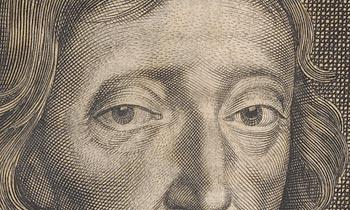
Listen to Mark Rylance reciting the invocation to the muse from Paradise Lost and Sonnet XXII.
Listen to NPR broadcast of Morgan Curator Declan Kiely discussing Paradise Lost »
Composition
John Milton was born in London on 9 December 1608. During the 1640s he wrote a series of pamphlets in defense of political, religious, and civil liberty, becoming the foremost polemicist of his day. He published his first collection of poems in 1646. Three years later, after the execution of Charles I, Milton was appointed secretary for foreign tongues (similar to the position of secretary of state) for the Commonwealth, England's republican government from 1649 to 1660. For the next ten years, he was the chief propagandist for Oliver Cromwell's regime as lord protector and the lightning rod for European reaction to the execution of the king.
Milton composed the ten books of Paradise Lost between 1658 and 1663. He had first planned the work as early as 1640, intending to write a tragedy titled Adam Unparadised. By 1652 he had become completely blind, probably due to glaucoma. Blindness forced him to compose orally, rendering him entirely reliant upon amanuenses (casual copyists among his friends and family circle) to whom he gave dictation. He composed the poem mostly at night or in the early morning, committing his composition to memory until someone was available to write down his words. He revised as his text was read back to him, so that a day's work amounted to twenty lines of verse. According to contemporary accounts, when dictating, the poet "sat leaning backward obliquely in an easy chair, with his leg flung over the elbow of it" or "composed lying in bed in the morning."
The only surviving manuscript of Paradise Lost is this 33-page fair copy, written in secretary script by a professional scribe, who probably transcribed patchwork pages of text Milton had dictated to several different amanuenses. This fair copy was corrected by at least five different hands under Milton's personal direction and became the printer's copy, used to set the type for the first edition of the book.
Publication
The Licensing Act, which was suspended during Cromwell's term as lord protector, was renewed in 1662. Printers and publishers therefore required a license in order to legally print and distribute any book. Printing was authorized only when an imprimatur (Latin for "let it be printed") was granted by the Stationers' Company. The imprimatur for Paradise Lost appears on the inside cover (the first page of the manuscript in the digital facsimile). Soiled with ink smudges and compositor's marks, printer's copy manuscripts were customarily discarded or recycled after printing. In this case the presence of the imprimatur may account for the survival of Book 1—no manuscripts of the nine other books of Paradise Lost survive.
Milton sold Paradise Lost to the printer Samuel Simmons for £5. The contract is dated 27 April 1667; the book was published in late October or early November 1667. Although Milton had completed Paradise Lost by 1665, publication was delayed by a paper shortage caused by the Second Anglo-Dutch War, the Great Plague (during which over eighty London printers died), and the Great Fire of London, 1666, which destroyed many of the city's presses. The absence of Simmons's name on the earliest title pages indicates that he may have been unable to print the book himself. The title pages that do bear Simmons's name do not give an address, suggesting that the printing of the first edition was assigned to Peter Parker.
Approximately thirteen hundred copies of the first edition were printed, with no fewer than six different title pages. Marketed at three shillings a copy, the first printing was sold out within eighteen months.
This exhibition is made possible through the generosity of Mr. and Mrs. Rudy L. Ruggles, Jr.
Thumbnails
Folio 1v
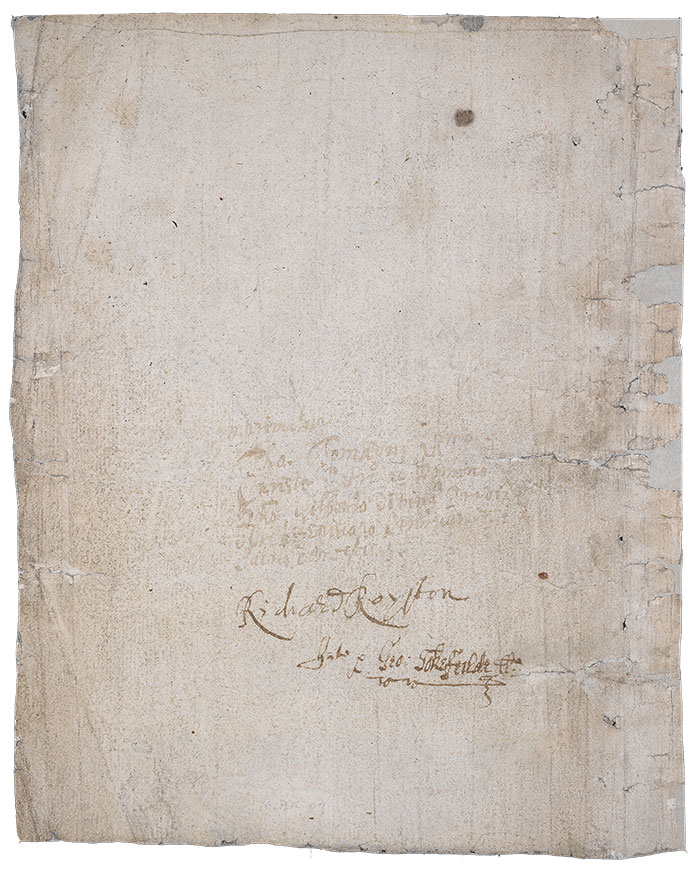
Paradise Lost.
Manuscript of Book I, in the hand of an amanuensis, ca. 1665.
Purchased by Pierpont Morgan, 1904
Imprimatur
Tho. Tomkyns RRmo. in
Christo Patri ac Domino
Dño Gilberto divinâ Providentiâ
Archiepiscopo Cantuarensi à
Sacris domesticis.
Richard Royston
Int[ratu]r p[er] Geo: Tokefeilde Cl[ericum]
"Let it be printed. Thomas Tomkyns, one of the religious servants of the most reverent father and lord in Christ, Lord Gilbert, by divine providence archbishop of Canterbury. Richard Royston. Entered by George Tokefield, clerk."
Translation by Professor Gordon Campbell.
Folio 2r
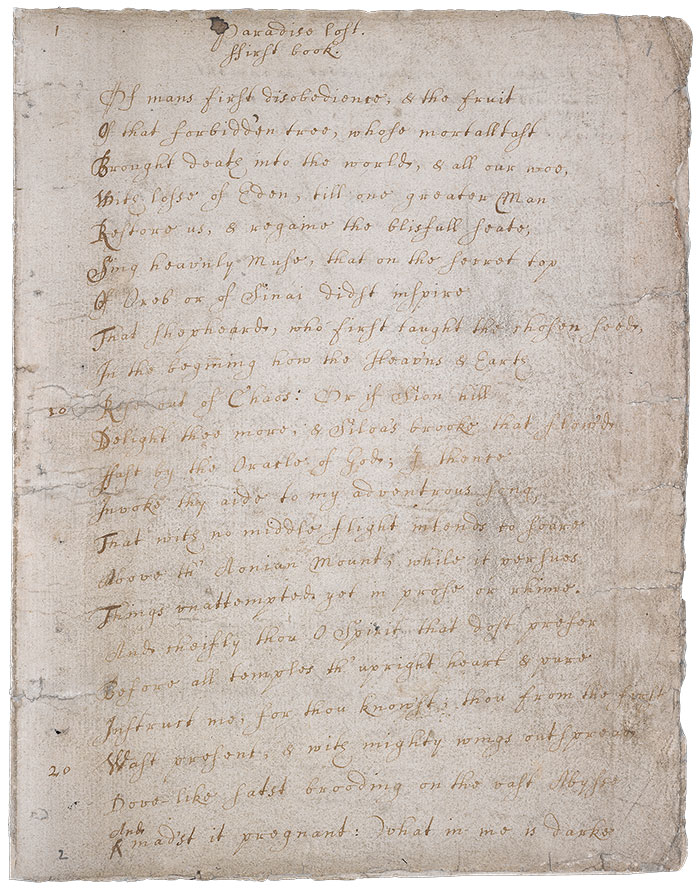
Paradise Lost.
Manuscript of Book I, in the hand of an amanuensis, ca. 1665.
Purchased by Pierpont Morgan, 1904
Of mans first disobedience, & the fruit
Of that forbidd'n tree, whose mortall tast
Brought death into the world, & all our woe,
With losse of Eden, till one greater Man
Restore us, & regaine the blisfull seate,
Sing heav'nly Muse, that on the secret top
Of Oreb or of Sinai didst inspire
That shepherd, who first taught the chosen seed,
In the beginning how the Heav'ns & Earth
Rose out of Chaos: Or if Sion hill
Delight thee more, and Siloa's brooke that flow'd
Fast by the Oracle of God; I thence
Invoke thy aide to my adventrous song,
That with no middle flight intends to soare
Above th' Aonian Mount; while it persues
Things unattempted yet in prose or rime.
And cheifly thou O Spirit that dost prefer
Before all temples th' upright heart & pure
Instruct me, for thou know'st; thou from the first
Wast present, & with mighty wings outspread
Dove-like satst brooding on the vast Abysse,
And mad'st it pregnant: What in me is darke
Folio 2v
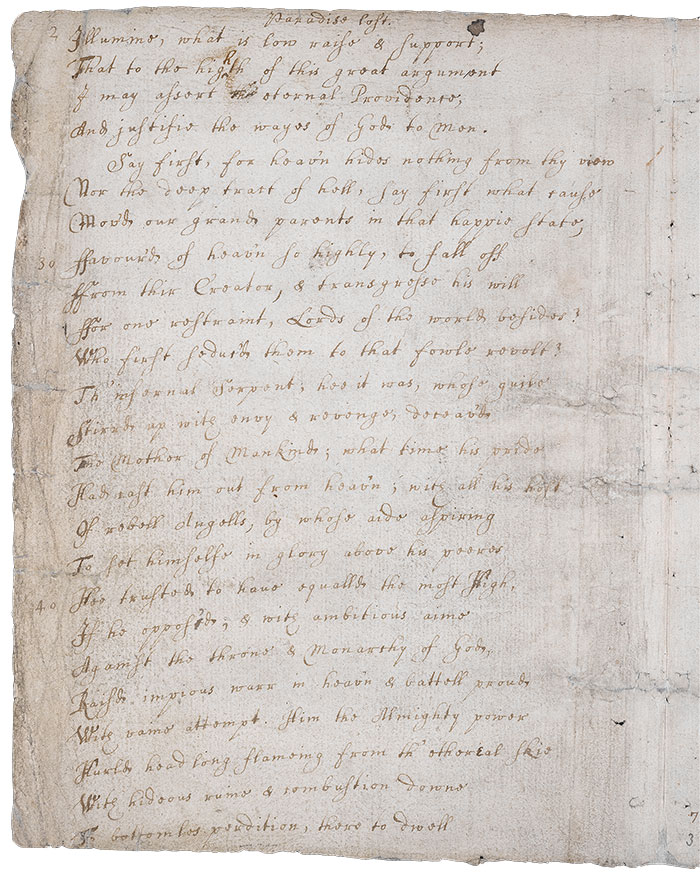
Paradise Lost.
Manuscript of Book I, in the hand of an amanuensis, ca. 1665.
Purchased by Pierpont Morgan, 1904
Illumine, what is low raise & support;
That to the highth of this great argument
I may assert eternal Providence,
And justifie the wayes of God to Men.
Say first, for heav'n hides nothing from thy view
Nor the deep tract of hell, say first what cause
Mov'd our grand parents in that happie state,
Favour'd of heav'n so highly, to fall off
From thir Creator, & transgresse his will
For one restraint, Lords of the world besides?
Who first seduc'd them to that fowle revolt?
Th' infernal Serpent; hee it was, whose guile
Stirrd up with envy & revenge, deceav'd
The Mother of Mankind; what time his pride
Had cast him out from heav'n; with all his host
Of rebell Angells, by whose aid aspiring
To set himselfe in glory above his peeres,
Hee trusted to have equalld the most High,
If he oppos'd; and with ambitious aime
Against the throne & Monarchy of God,
Raisd impious warr in heav'n & battell proud
With vaine attempt. Him the Almighty power
Hurld headlong flameing from th' ethereal skie
With hideous ruine & combustion downe
To bottomles perdition, there to dwell
Folio 3r
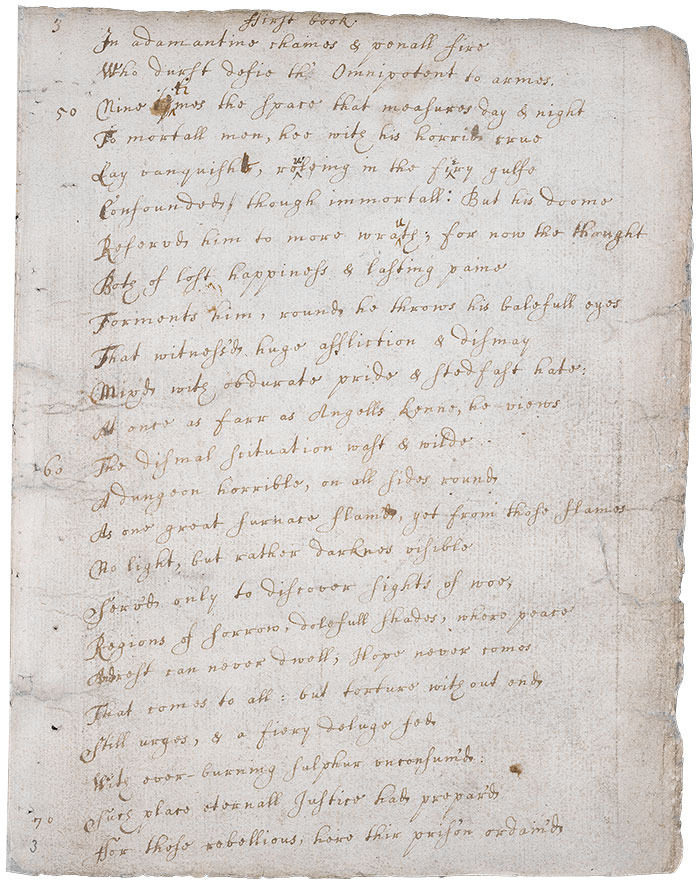
Paradise Lost.
Manuscript of Book I, in the hand of an amanuensis, ca. 1665.
Purchased by Pierpont Morgan, 1904
In adamantine chaines & penall fire
Who durst defie th' Omnipotent to armes.
Nine times the space that measures day & night
To mortall men, hee with his horrid crue
Lay vanquisht, rowling in the fiery gulfe
Confounded though immortall: But his doome
Reservd him to more wrauth; for now the thought
Both of lost happiness & lasting paine
Torments him, round he throws his balefull eyes
That witness'd huge affliction & dismay
Mix'd with obdurate pride & stedfast hate:
At once as farr as Angells kenne he views
The dismal scituation waste & wilde
A dungeon horrible, on all sides round
As one great Furnace flam'd, yet from those flames
No light, but rather darknes visible
Serv'd only to discover sights of woe,
Regions of sorrow, dolefull shades, where peace
And rest can never dwell; Hope never comes
That comes to all: but torture without end
Still urges, & a fiery deluge fed
With ever-burning sulphur unconsum'd:
Such place eternall Justice had prepar'd
For these rebellious, here thir prison ordain'd
Folio 3v
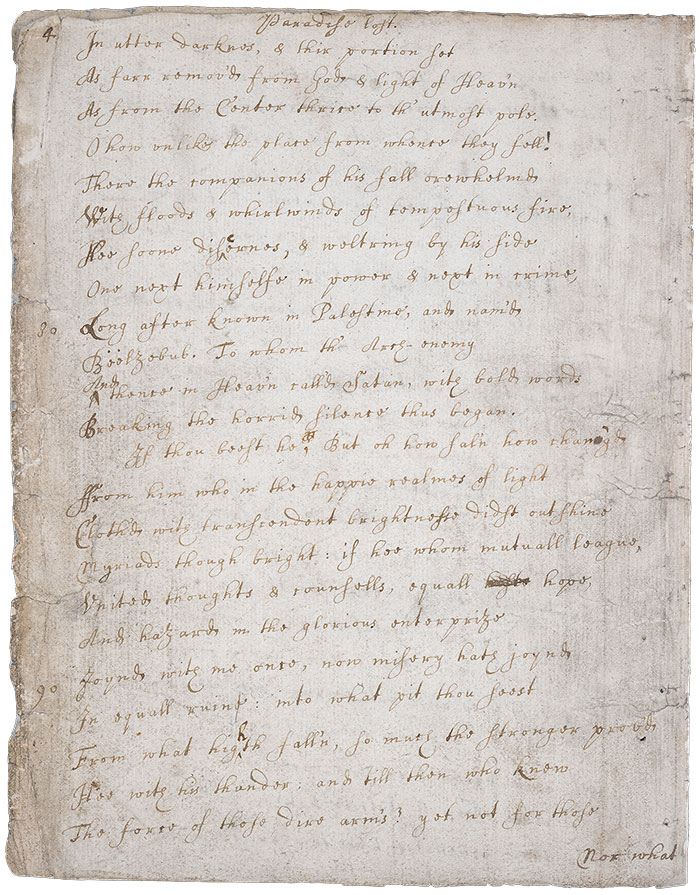
Paradise Lost.
Manuscript of Book I, in the hand of an amanuensis, ca. 1665.
Purchased by Pierpont Morgan, 1904
In utter darkness, & thir portion set
As farr remov'd from God and light of Heav'n
As from the Center thrice to th' utmost pole.
O how unlike the place from whence they fell!
There the companions of his fall orewhelmd
With floods & whirlwinds of tempestuous fire,
Hee soone discernes, & weltring by his side
One next himselfe in power & next in crime,
Long after known in Palestine, and nam'd
Beelzebub. To whom th' Arch-enemy,
And thence in Heav'n call'd Satan, with bold words
Breaking the horrid silence thus began.
If thou beest he, But O how fal'n how chang'd
From him who in the happie realmes of light
Cloth'd with transcendent brightnesse didst outshine
Myriads though bright: if hee whom mutuall league,
United thoughts & counsells, equall hope,
And hazard in the glorious enterprize
Joynd with me once, now misery hath joynd
In equall ruin: into what pit thou seest
From what highth fall'n, so much the stronger prov'd
Hee with his thunder: and till then who knew
The force of those dire arm's? yet not for those
Folio 4r
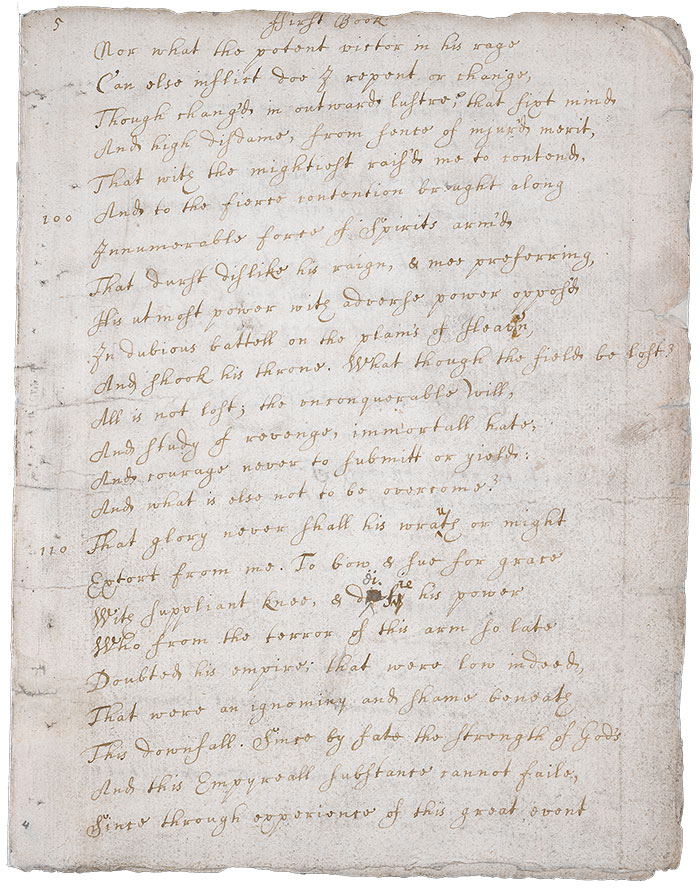
Paradise Lost.
Manuscript of Book I, in the hand of an amanuensis, ca. 1665.
Purchased by Pierpont Morgan, 1904
Nor what the potent victor in his rage
Can else inflict doe I repent or change,
Though chang'd in outward lustre; that fixt mind
And high disdaine, from sence of injur'd merit,
That with the mightiest rais'd me to contend,
And to the fierce contention brought along
Innumerable force of Spirits arm'd
That durst dislike his raign, & mee preferring,
His utmost power with adverse power oppos'd
In dubious battell on the plain's of Heav'n,
And shook his throne. What though the field be lost?
All is not lost; the unconquerable will,
And study of revenge, immortall hate,
And courage never to submitt or yield:
And what is else not to be overcome?
That glory never shall his wrauth or might
Extort from me. To bow & sue for grace
With suppliant knee, and deifie his power
Who from the terror of this arm so late
Doubted his empire; that were low indeed,
That were an ignominy and shame beneath
This downfall. Since by fate the strength of God's
And this Empyreall substance cannot faile,
Since through experience of this great event
Folio 4v
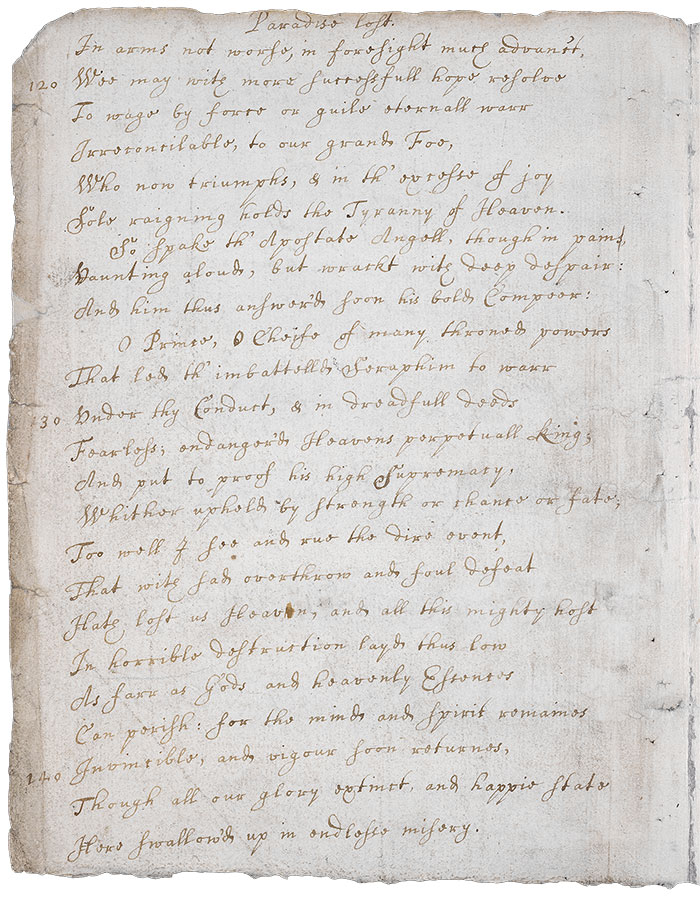
Paradise Lost.
Manuscript of Book I, in the hand of an amanuensis, ca. 1665.
Purchased by Pierpont Morgan, 1904
In arms not worse, in foresight much advanc't,
Wee may with more successfull hope resolve
To wage by force or guile eternall warr
Irreconcileable, to our grand Foe,
Who now triumphs, & in th' excesse of joy
Sole raigning holds the Tyranny of Heaven.
So spake th' Apostate Angell, though in pain,
Vaunting aloud, but wrackt with deep despair:
And him thus answer'd soon his bold Compeer:
O Prince, O Cheife of many throned powers,
That led th' imbattelld Seraphim to warr
Under thy Conduct, & in dreadfull deeds
Fearless; endanger'd Heavens perpetuall King;
And put to proof his high Supremacy,
Whither upheld by strength or chance or fate;
Too well I see and rue the dire event,
That with sad overthrow and foul defeat
Hath lost us Heaven, and all this mighty host
In horrible destruction layd thus low
As farr as Gods and heavenly Essences
Can perish: for the mind and spirit remaines
Invincible, and vigour soon returnes,
Though all our glory extinct, and happie state
Here swallow'd up in endlesse misery.
Folio 5r
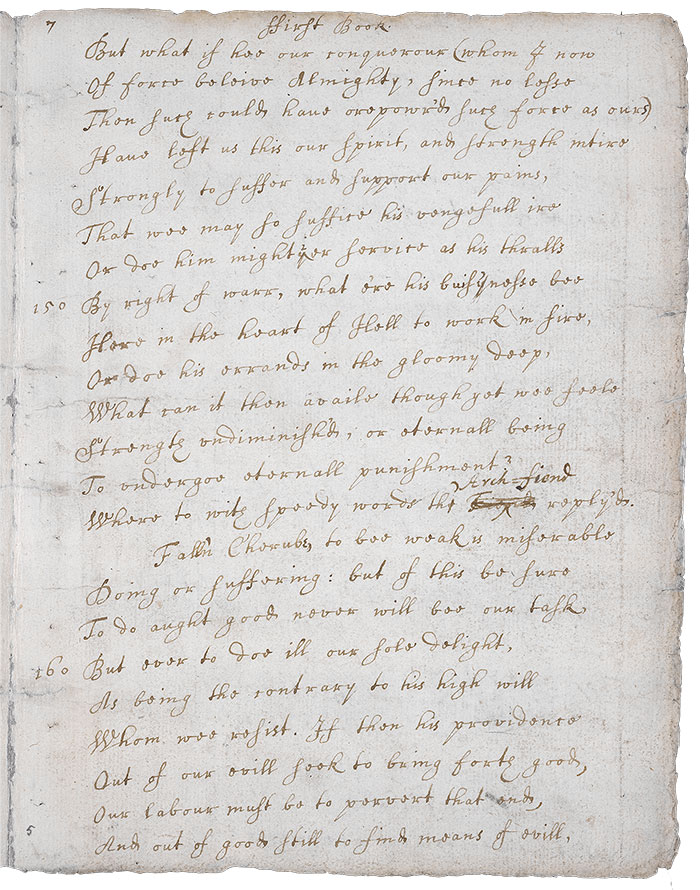
Paradise Lost.
Manuscript of Book I, in the hand of an amanuensis, ca. 1665.
Purchased by Pierpont Morgan, 1904
But what if hee our conquerour, (whom I now
Of force beleive Almighty, since no lesse
Then such could have orepowr'd such force as ours)
Have left us this our spirit, and strength intire
Strongly to suffer and support our pains,
That wee may so suffice his vengefull ire
Or doe him mightier service as his thralls
By right of warr, what e're his buis'nesse bee
Here in the heart of Hell to work in fire,
Or doe his errands in the gloomy deep,
What can it then availe though yet wee feele
Strength undiminish'd, or eternall being
To undergoe eternall punishment?
Where to with speedy words th' Arch-fiend reply'd.
Fall'n Cherube, to bee weak is miserable
Doing or suffering: but of this be sure
To do aught good never will bee our task,
But ever to doe ill our sole delight,
As being the contrary to his high will
Whom wee resist. If then his providence
Out of our evill seek to bring forth good,
Our labour must be to pervert that end,
And out of good still to find means of evill,
Folio 5v
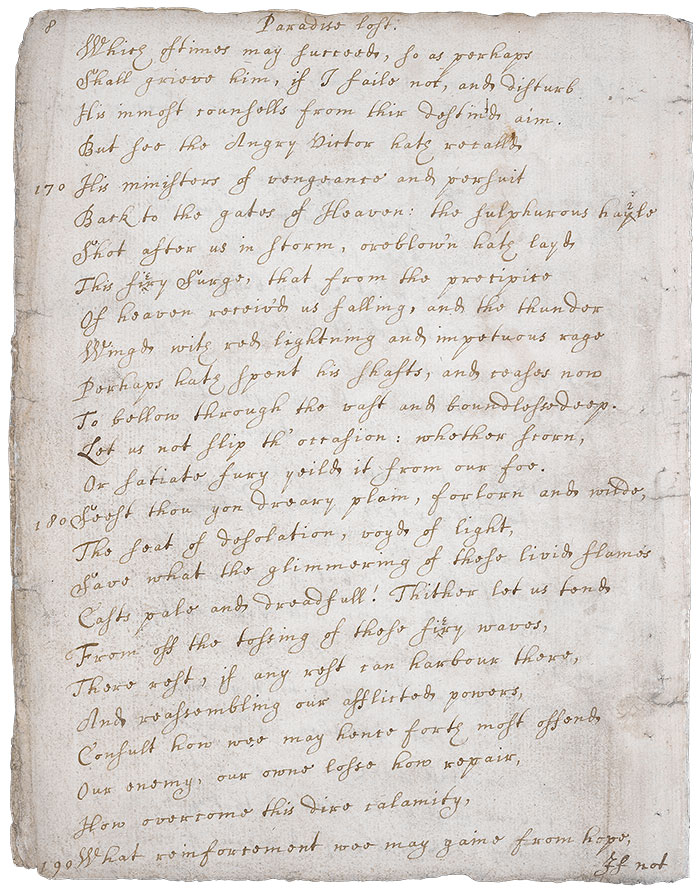
Paradise Lost.
Manuscript of Book I, in the hand of an amanuensis, ca. 1665.
Purchased by Pierpont Morgan, 1904
Which oftimes may succeed, so as perhaps
Shall grieve him, if I faile not, and disturb
His inmost counsells from thir destind aim.
But see the Angry Victor hath recall'd
His ministers of vengeance and persuit
Back to the gates of Heaven: The sulphurous haile
Shot after us in storm, oreblow'n hath layd
This fiery Surge, that from the precipice
Of heaven receiv'd us falling, and the thunder
Wingd with red lightning and impetuous rage
Perhaps hath spent his shafts, and ceases now
To bellow through the vast and boundlesse deep.
Let us not slip th' occasion: whether scorn,
Or satiate fury yeild it from our foe.
Seest thou yon dreary plain, forlorn and wilde,
The seat of desolation, voyd of light,
Save what the glimmering of these livid flames
Casts pale and dreadfull! Thither let us tend
From off the tossing of these fiery waves,
There rest, if any rest can harbour there,
And reassembling our afflicted powers,
Consult how wee may hence forth most offend
Our enemy, our owne losse how repair,
How overcome this dire calamity,
What reinforcement wee may gaine from hope,
Folio 6r

Paradise Lost.
Manuscript of Book I, in the hand of an amanuensis, ca. 1665.
Purchased by Pierpont Morgan, 1904
If not what resolution from despair.
Thus Satan talking to his neerest Mate
With head uplift above the wave, and eys
That sparkling blaz'd, his other parts besides
Prone on the flood, extended long and large
Lay floating many a rood, in bulk as huge
As whom the fables name of monstrous size,
Titanian, or earth-born, that warr'd on Jove,
Briareos or Typhon, whom the Den
By ancient Tarsus held, or that Sea-beast
Leviathan, which God of all his works,
Created hugest that swim th' Ocean stream;
Him haply slumbring on the Norway foame
The Pilot of some small night-foundered skiff,
Deeming some Iland, oft, as Seamen tell
With fixed Anchor in his Scaly rinde
Moores by his side under the Lee, while night
Invests the sea, and wished morn delayes.
So stretcht out huge in length the Arch-fiend lay
Chain'd on the burning lake, nor ever thence
Had risen or heav'd his head, but that the will
And high permission of all-ruleing heaven
Left him at large to his own dark designs,
That with reiterated crimes hee might
Folio 6v
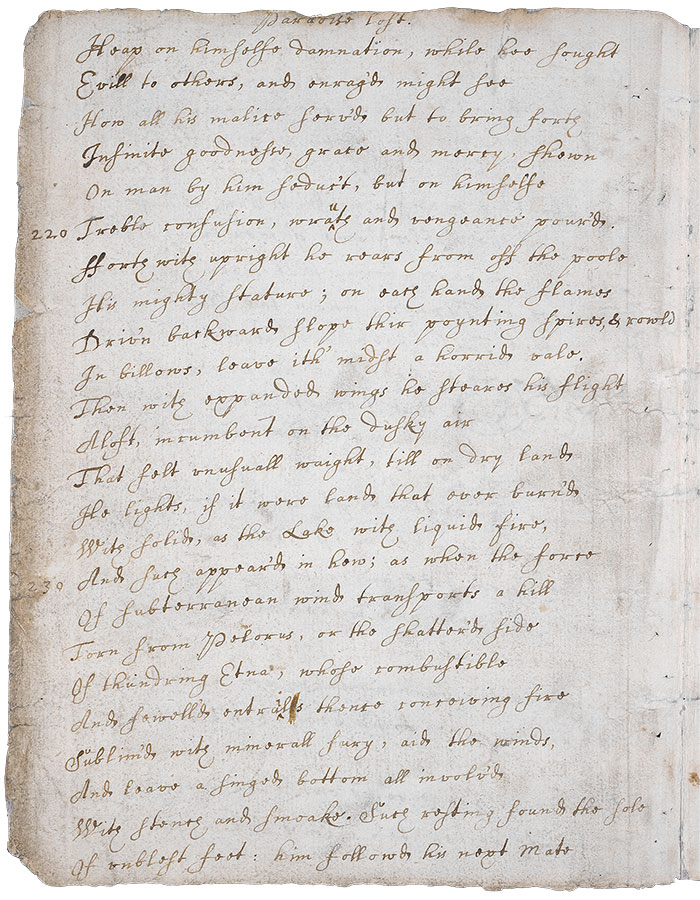
Paradise Lost.
Manuscript of Book I, in the hand of an amanuensis, ca. 1665.
Purchased by Pierpont Morgan, 1904
Heap on himselfe damnation, while hee sought
Evill to others, and enrag'd might see
How all his malice serv'd but to bring forth
Infinite goodnesse, grace and mercy, shewn
On man by him seduc't, but on himselfe
Treble confusion, wrauth and vengeance pour'd.
Forth with upright he rears from off the poole
His mighty stature; on each hand the flames
Driv'n backward slope thir poynting spires, & rowld
In billows, leave ith' midst a horrid vale.
Then with expanded wings he steares his flight
Aloft, incumbent on the dusky air
That felt unusuall waight, till on dry land
He lights, if it were land that ever burn'd
With solid, as the Lake with liquid fire,
And such appear'd in hew; as when the force
Of subterranean wind transports a hill
Torn from Pelorus, or the shatter'd side
Of thundring Etna, whose combustible
And fewell'd entrails thence conceiving fire
Sublim'd with minerall fury, aid the winds,
And leave a singed bottom all involv'd
With stench and smoak. Such resting found the sole
Of unblest feet: him followd his next Mate
Folio 7r
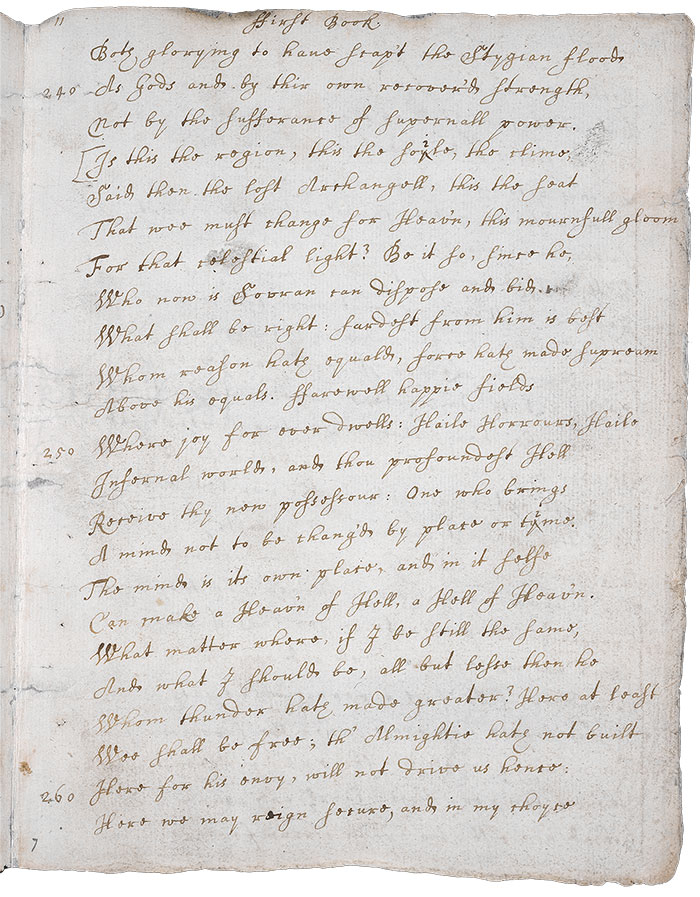
Paradise Lost.
Manuscript of Book I, in the hand of an amanuensis, ca. 1665.
Purchased by Pierpont Morgan, 1904
Both glorying to have scap't the Stygian flood
As Gods, and by thir own recover'd strength,
Not by the sufferance of supernall power.
[Is this the region, this the soile, the clime,
Said then the lost Archangell, this the seat
That wee must change for Heav'n, this mournfull gloom
For that celestial light? Be it so, since he,
Who now is Sovran can dispose and bid
What shall be right: fardest from him is best
Whom reason hath equald, force hath made supream
Above his equals. Farewell happie fields
Where joy for ever dwells: Hail Horrours, Haile
Infernal world, and thou profoundest Hell
Receive thy new possessour: One who brings
A mind not to be chang'd by place or time.
The mind is its own place, and in it selfe
Can make a Heav'n of Hell, a Hell of Heav'n.
What matter where, if I be still the same,
And what I should be, all but lesse then he
Whom thunder hath made greater? Here at least
Wee shall be free; th' Almightie hath not built
Here for his envy, will not drive us hence:
Here we may reign secure, and in my choyce
Folio 7v
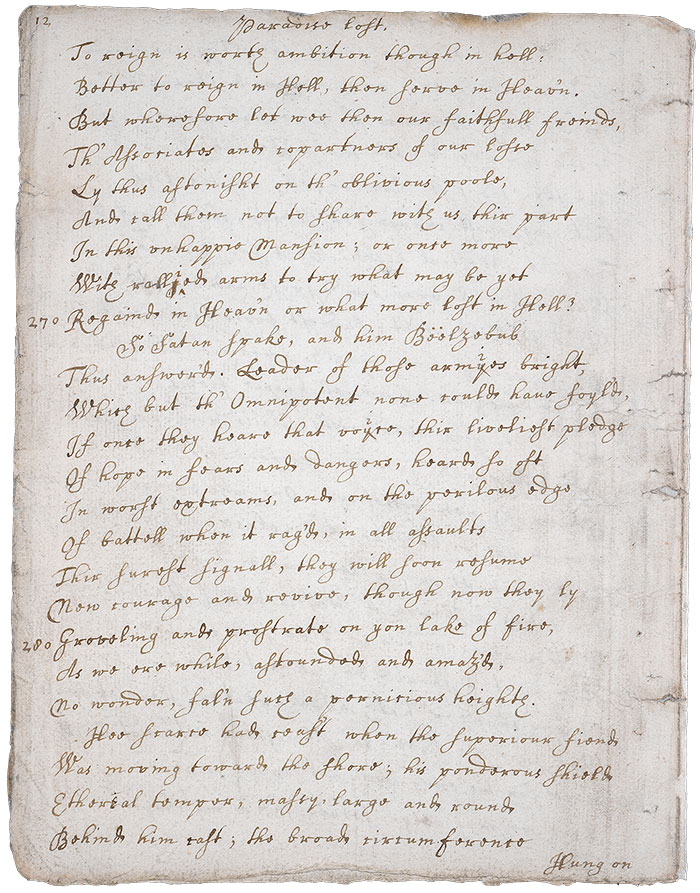
Paradise Lost.
Manuscript of Book I, in the hand of an amanuensis, ca. 1665.
Purchased by Pierpont Morgan, 1904
To reign is worth ambition though in hell:
Better to reign in Hell, then serve in Heav'n.
But wherefore let wee then our faithfull friends,
Th' Associates and copartners of our losse
Ly thus astonisht on th' oblivious poole,
And call them not to share with us thir part
In this unhappie Mansion, or once more
With rallied arms to try what may be yet
Regaind in Heav'n, or what more lost in Hell?
So Satan spake, and him Beelzebub
Thus answer'd. Leader of those Armies bright,
Which but th' Omnipotent none could have foyl'd,
If once they heare that voice, thir liveliest pledge
Of hope in fears and dangers, heard so oft
In worst extreams, and on the perilous edge
Of battell when it rag'd, in all assaults
Thir surest signall, they will soon resume
New courage and revive, though now they ly
Groveling and prostrate on yon lake of fire,
As we ere while, astounded and amaz'd,
No wonder, fall'n such a pernicious highth.
Hee scarce had ceas't when the superiour fiend
Was moving toward the shore; his ponderous shield
Ethereal temper, massy, large and round
Behind him cast; the broad circumference
Folio 8r
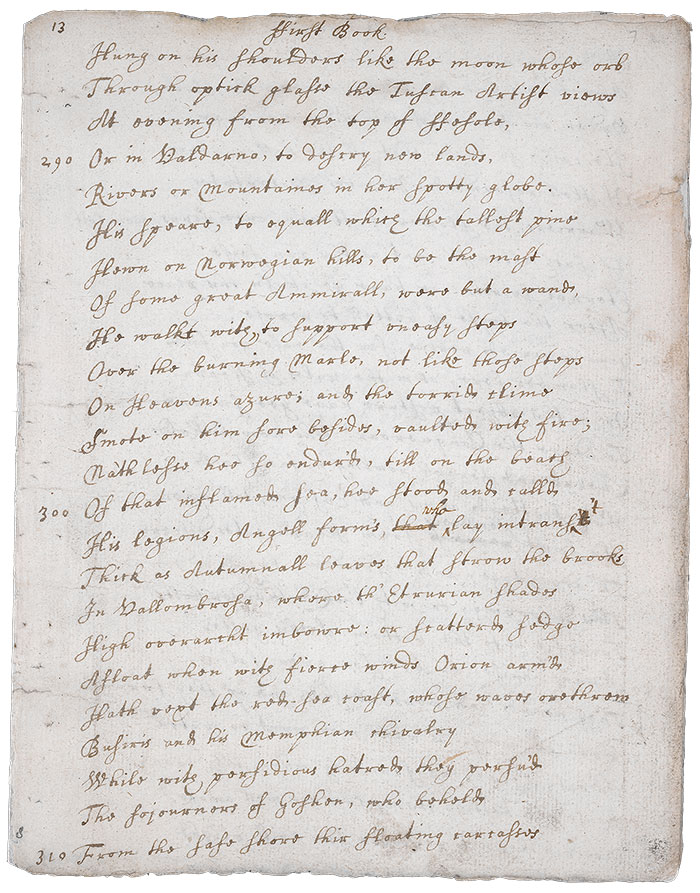
Paradise Lost.
Manuscript of Book I, in the hand of an amanuensis, ca. 1665.
Purchased by Pierpont Morgan, 1904
Hung on his shoulders like the moon whose orb
Through optick glasse the Tuscan Artist views
At evening from the top of Fesole,
Or in Valdarno, to descry new lands,
Rivers or Mountaines in her spotty globe.
His speare, to equall which the tallest pine
Hewn on Norwegian hills, to be the mast
Of some great Ammirall, were but a wand,
He walkt with, to support uneasy steps
Over the burning Marle, not like those steps
On Heavens azure; and the torrid clime
Smote on him sore besides, vaulted with fire;
Nathlesse hee so endur'd, till on the beach
Of that inflamed sea, hee stood and calld
His legions, Angell form's, who lay intrans't
Thick as Autumnall leaves that strow the brooks
In Vallombrosa, where th' Etrurian shades
High overarch't imbowre: or scatterd sedge
Afloat when with fierce winds Orion arm'd
Hath vext the red-sea coast, whose waves orethrew
Busiris and his Memphian chivalry
While with perfidious hatred they persu'd
The sojourners of Goshen, who beheld
From the safe shore thir floating carcasses
Folio 8v
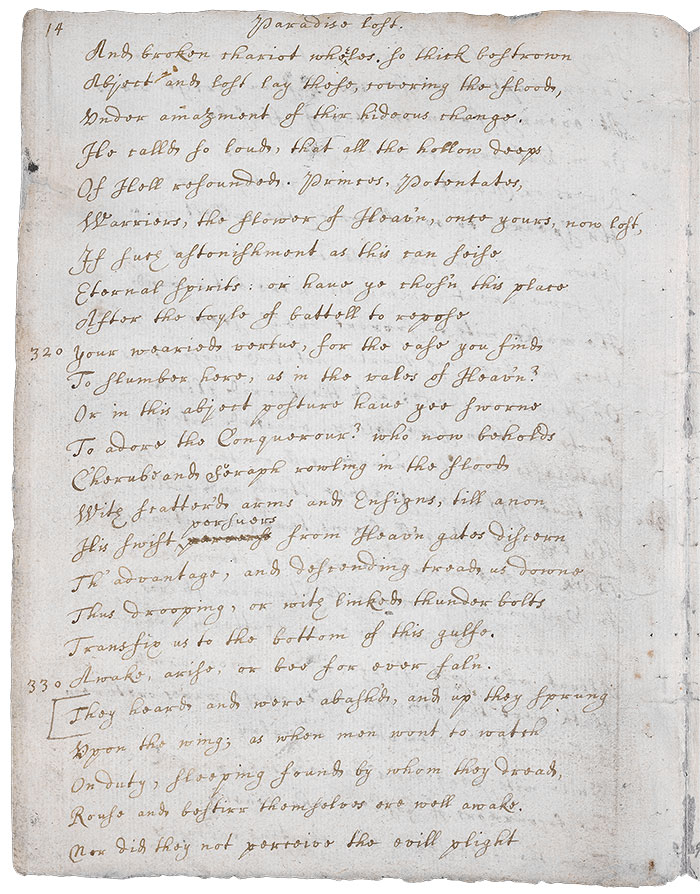
Paradise Lost.
Manuscript of Book I, in the hand of an amanuensis, ca. 1665.
Purchased by Pierpont Morgan, 1904
And broken chariot wheeles. so thick bestrown
Abject and lost lay these, covering the flood,
Under amazment of thir hideous change.
He calld so loud, that all the hollow deeps
Of Hell resounded. Princes, Potentates,
Warriers, the flower of Heav'n, once yours, now lost,
If such astonishment as this can seise
Eternal spirits: or have ye chos'n this place
After the toyle of battell to repose
Your wearied vertue, for the ease you find
To slumber here, as in the vales of Heav'n?
Or in this abject posture have yee sworne
To adore the Conquerour? who now beholds
Cherube and Seraph rowling in the flood
With scatter'd arms and Ensigns, till anon
His swift persuers from Heav'n gates discern
Th' advantage, and descending tread us downe
Thus drooping, or with linked thunderbolts
Transfix us to the bottom of this gulfe.
Awake, arise, or bee for ever fal'n.
[They heard, and were abash'd, and up they sprung
Upon the wing; as when men wont to watch
On duty, sleeping found by whom they dread,
Rouse and bestirr themselves ere well awake.
Nor did they not perceive the evill plight
Folio 9r
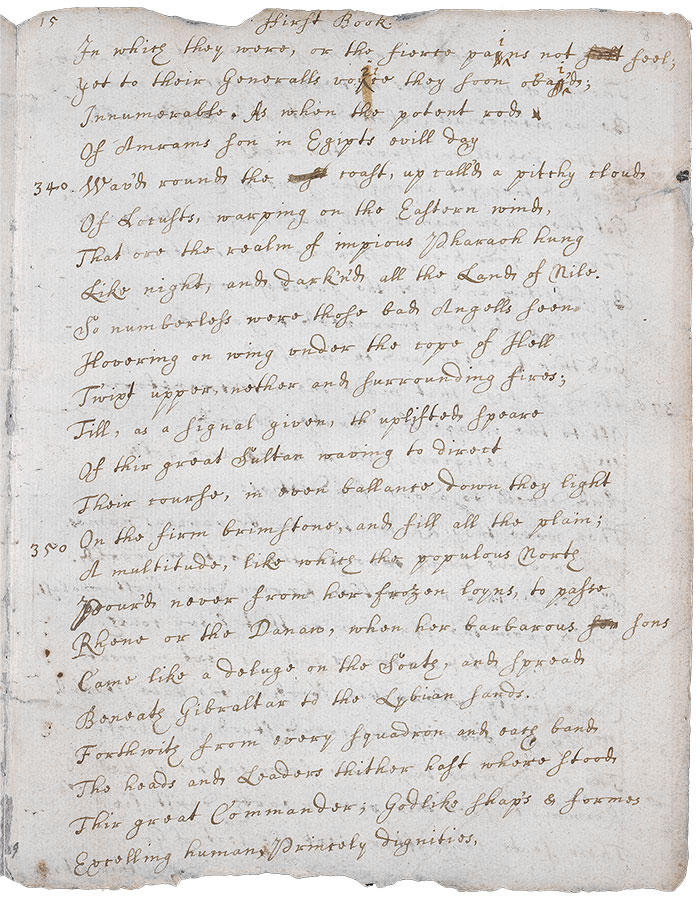
Paradise Lost.
Manuscript of Book I, in the hand of an amanuensis, ca. 1665.
Purchased by Pierpont Morgan, 1904
In which they were, or the fierce pains not feel;
Yet to their Generalls voice they soon obai'd;
Innumerable. As when the potent rod
Of Amrams son in Egipts evill day
Wav'd round the coast, up call'd a pitchy cloud
Of Locusts, warping on the Eastern wind,
That ore the realm of impious Pharoah hung
Like night, and dark'n'd all the Land of Nile.
So numberless were those bad Angells seen
Hovering on wing under the cope of Hell
T'wixt upper, nether, and surrounding fires;
Till, as a signal given, th' uplifted speare
Of thir great Sultan waving to direct
Their course, in even ballance down they light
On the firm brimstone, and fill all the plain;
A multitude, like which the populous North
Pour'd never from her frozen loyns, to passe
Rhene or the Danaw, when her barbarous sons
Came like a deluge on the South, and spread
Beneath Gibraltar to the Lybian sands.
Forthwith from every squadron and each band
The heads and Leaders thither hast where stood
Thir great Commander; Godlike shap's & formes
Excelling human, Princely dignities,
Folio 9v
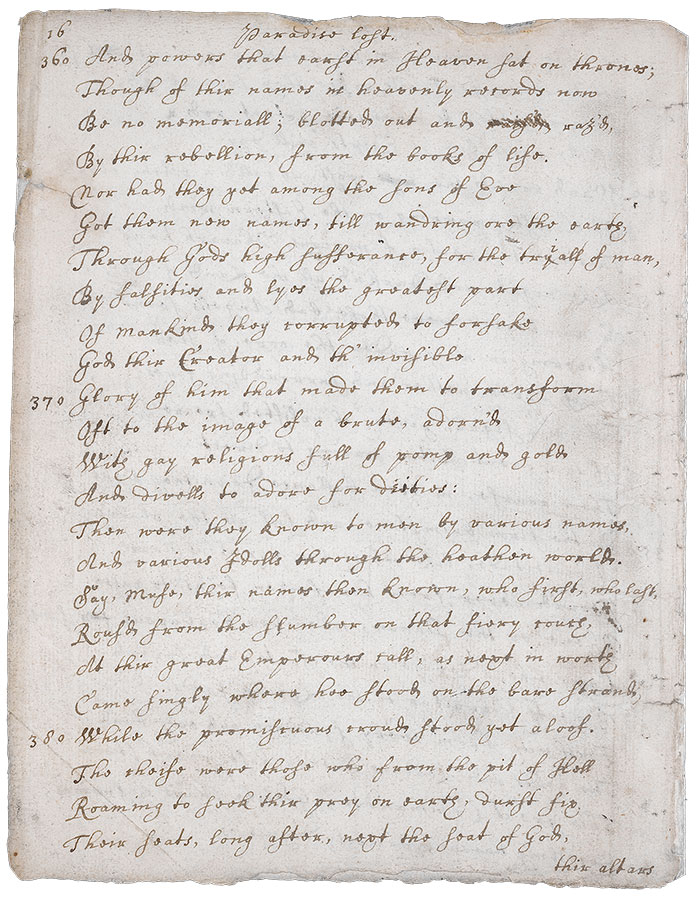
Paradise Lost.
Manuscript of Book I, in the hand of an amanuensis, ca. 1665.
Purchased by Pierpont Morgan, 1904
And powers that earst in Heaven sat on thrones;
Though of thir names in heavenly records now
Be no memoriall, blotted out and raz'd,
By thir rebellion, from the books of life.
Nor had they yet among the sons of Eve
Got them new names, till wandring ore the earth,
Through Gods high sufferance for the trial of man,
By falsities and lyes the greatest part
Of Mankind they corrupted to forsake
God thir Creator and th' invisible
Glory of him that made them to transform
Oft to the image of a brute, adorn'd
With gay religions full of pomp and gold
And divells to adore for deities:
Then were they known to men by various names,
And various Idolls through the heathen world.
Say, Muse, thir names then known, who first, who last,
Rous'd from the slumber, on that fiery couch,
At thir great Emperours call, as next in worth
Came singly where hee stood on the bare strand,
While the promiscuous croud stood yet aloof.
The cheife were those who from the pit of Hell
Roaming to seek thir prey on earth, durst fix
Their seats, long after, next the Seat of God,
Folio 10r
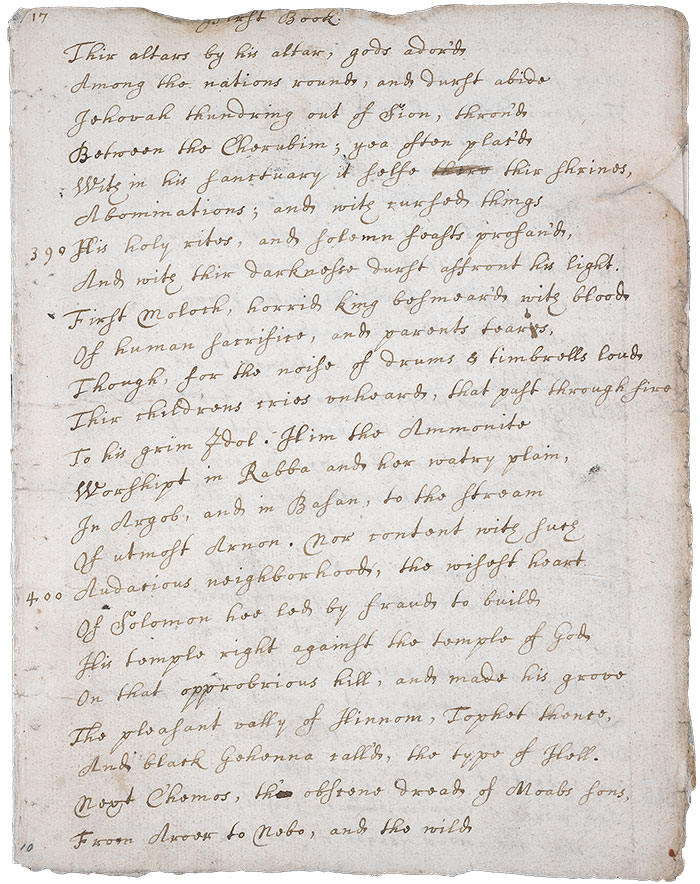
Paradise Lost.
Manuscript of Book I, in the hand of an amanuensis, ca. 1665.
Purchased by Pierpont Morgan, 1904
Thir altars by his altar, gods ador'd
Among the nations round, and durst abide
Jehovah thundring out of Sion, thron'd
Between the Cherubim; yea often plac'd
With in his sanctuary it selfe thir shrines,
Abominations; and with cursed things
His holy rites, and solemn feasts profan'd,
And with thir darknesse durst affront his light.
First Moloch, horrid king besmear'd with blood
Of human sacrifice, and parents teares,
Though, for the noise of drums & timbrells loud
Thir childrens cries unheard, that past through fire
To his grim Idol. Him the Ammonite
Worshipt in Rabba and her watry plain,
In Argob, and in Basan, to the stream
Of utmost Arnon. Nor content with such
Audacious neighbourhood, the wisest heart
Of Solomon hee led by fraud to build
His temple right against the temple of God
On that opprobrious hill, and made his grove
The pleasant vally of Hinnom, Tophet thence,
And black Gehenna call'd, the type of Hell.
Next Chemos, th' obscene dread of Moabs sons,
From Aroer to Nebo, and the wild
Paradise Lost. Manuscript of Book I, in the hand of an amanuensis, ca. 1665.
Folio 10v
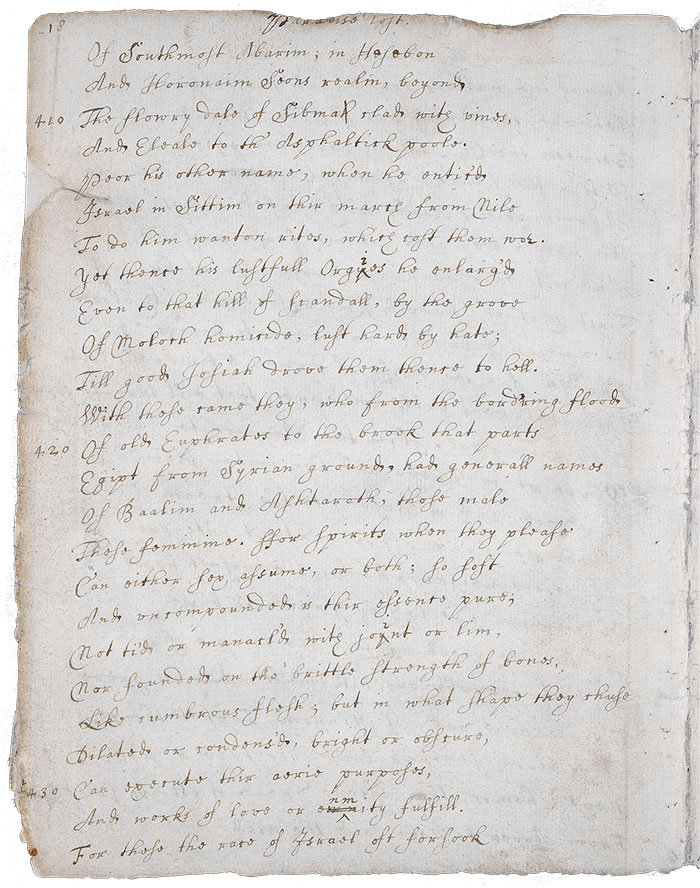
Paradise Lost.
Manuscript of Book I, in the hand of an amanuensis, ca. 1665.
Purchased by Pierpont Morgan, 1904
Of Southmost Abarim; in Hesebon
And Horonaim Seons realm, beyond
The flowry dale of Sibma clad with vines,
And Eleale to th' Asphaltick poole.
Peor his other name, when he entic'd
Israel in Sittim on thir march from Nile
To do him wanton rites, which cost them woe.
Yet thence his lustfull Orgies he enlarg'd
Even to that hill of scandall, by the grove
Of Moloch homicide, lust hard by hate;
Till good Josiah drove them thence to hell.
With these came they, who from the bord'ring flood
Of old Euphrates to the brook that parts
Egipt from Syrian ground, had generall names
Of Baalim and Ashtaroth, those male
These feminine. For spirits when they please
Can either sex assume, or both; so soft
And uncompounded is thir essence pure;
Not ti'd or manacl'd with joint or lim,
Nor founded on the brittle strength of bones,
Like cumbrous flesh; but in what shape they chuse
Dilated or condens'd, bright or obscure,
Can execute thir aerie purposes,
And works of love or enmity fulfill.
For these the race of Israel oft forsook
Paradise Lost. Manuscript of Book I, in the hand of an amanuensis, ca. 1665.
Folio 11r
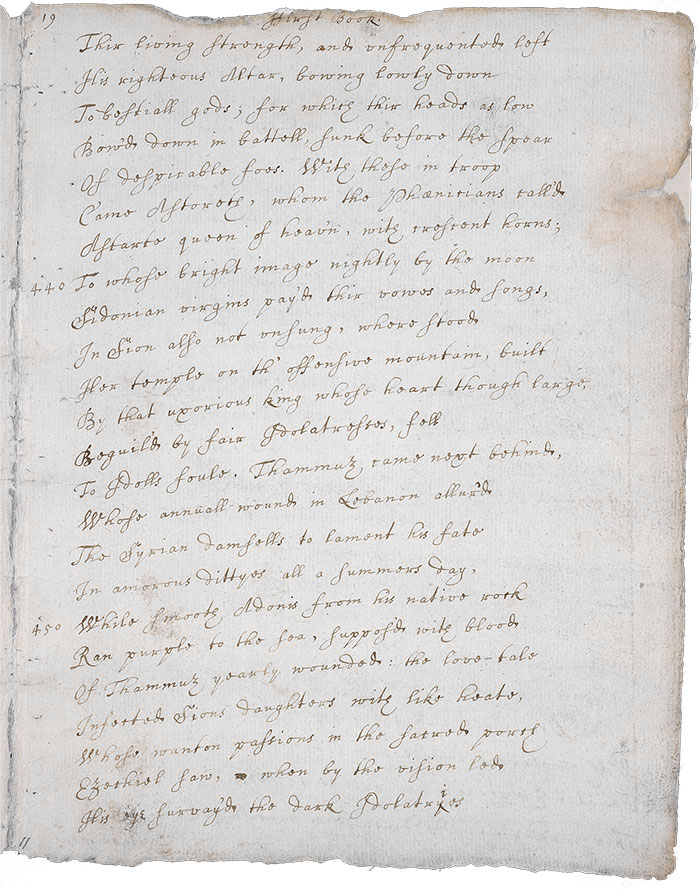
Paradise Lost.
Manuscript of Book I, in the hand of an amanuensis, ca. 1665.
Purchased by Pierpont Morgan, 1904
Thir living strength, and unfrequented left
His righteous Altar, bowing lowly down
To bestiall gods; for which thir heads as low
Bow'd down in battell, sunk before the spear
Of despicable foes. With these in troop
Came Astoreth, whom the Phoenicians call'd
Astarte queen of heav'n, with crescent horns;
To whose bright image nightly by the moon
Sidonian virgins pay'd thir vows and songs,
In Sion also not unsung, where stood
Her temple on th' offensive mountain, built
By that uxorious king whose heart though large,
Beguil'd by fair Idolatresses, fell
To Idolls foule. Thammuz came next behind,
Whose annuall wound in Lebanon allur'd
The Syrian damsells to lament his fate
In amorous dittyes all a summers day,
While smooth Adonis from his native rock
Ran purple to the sea, suppos'd with blood
Of Thammuz yearly wounded: the love-tale
Infected Sions daughters with like heate,
Whose wanton passions in the sacred porch
Ezekiel saw, when by the vision led
His eye survay'd the dark Idolatries
Paradise Lost. Manuscript of Book I, in the hand of an amanuensis, ca. 1665.
Folio 11v
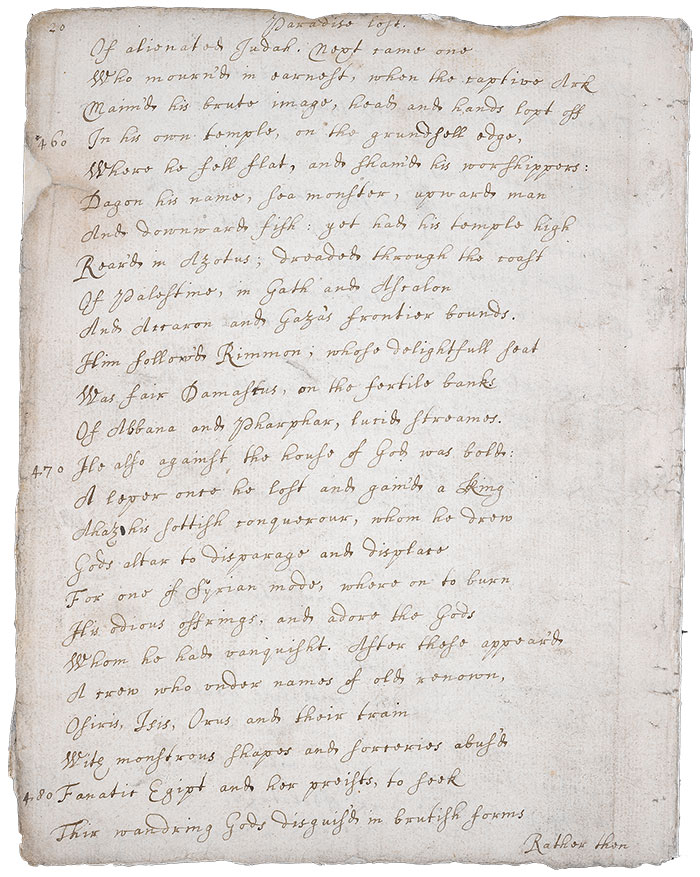
Paradise Lost.
Manuscript of Book I, in the hand of an amanuensis, ca. 1665.
Purchased by Pierpont Morgan, 1904
Of alienated Judah. Next came one
Who mourn'd in earnest, when the captive Ark
Maim'd his brute image, head and hands lopt off
In his own temple, on the grundsell edge,
Where he fell flat, and sham'd his worshippers:
Dagon his name, sea monster, upward man
And downward fish: yet had his temple high
Rear'd in Azotus; dreaded through the coast
Of Palestine, in Gath and Ascalon,
And Accaron and Gaza's frontier bounds.
Him follow'd Rimmon, whose delightfull seat
Was fair Damascus, on the fertile banks
Of Abbana and Pharphar, lucid streames.
He also against the house of God was bold:
A leper once he lost and gain'd a King,
Ahaz his sottish conquerour, whom he drew
Gods altar to disparage and displace
For one of Syrian mode, where on to burn
His odious offrings, and adore the Gods
Whom he had vanquisht. After these appear'd
A crew who under names of old renown,
Osiris, Isis, Orus and their train
With monstrous shapes and sorceries abus'd
Fanatic Egipt and her preists, to seek
Thir wandring Gods disguis'd in brutish forms
Paradise Lost. Manuscript of Book I, in the hand of an amanuensis, ca. 1665.
Folio 12r
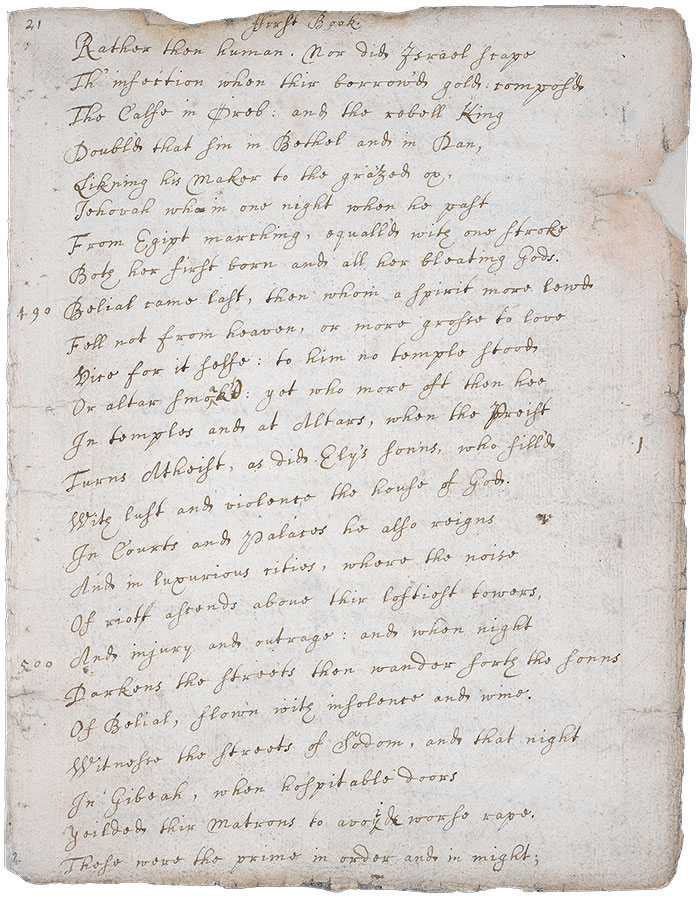
Paradise Lost.
Manuscript of Book I, in the hand of an amanuensis, ca. 1665.
Purchased by Pierpont Morgan, 1904
Rather then human. Nor did Israel scape
Th' infection when thir borrow'd gold compos'd
The Calfe in Oreb: and the rebell King
Doubl'd that sin in Bethel and in Dan,
Likning his Maker to the grazed ox,
Jehovah, who in one night when he past
From Egipt marching, equall'd with one stroke
Both her first born and all her bleating Gods.
Belial came last, then whom a spirit more lewd
Fell not from heaven, or more grosse to love
Vice for it selfe: to him no temple stood
Or altar smoakd; yet who more oft then hee
In temples and at Altars, when the Preist
Turns Atheist, as did Ely's sonns, who fill'd
With lust and violence the house of God.
In Courts and Palaces he also reigns
And in luxurious cities, where the noise
Of riot ascends above thir loftiest towers,
And injury and outrage: and when night
Darkens the streets then wander forth the sonns
Of Belial, flown with insolence and wine.
Witnesse the streets of Sodom, and that night
In Gibeah, when hospitable doors
Yeilded thir Matrons to avoide worse rape.
These were the prime in order and in might;
Paradise Lost. Manuscript of Book I, in the hand of an amanuensis, ca. 1665.
Folio 12v
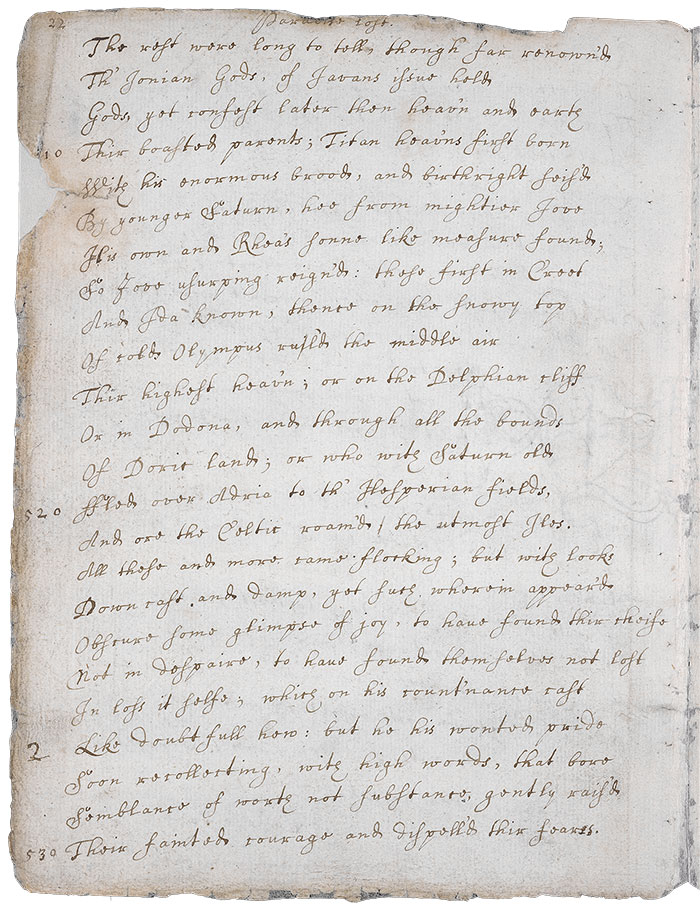
Paradise Lost.
Manuscript of Book I, in the hand of an amanuensis, ca. 1665.
Purchased by Pierpont Morgan, 1904
The rest were long to tell, though far renown'd,
Th' Ionian Gods, of Javans issue held
Gods, yet confest later then heav'n and earth
Thir boasted parents; Titan heav'ns first born
With his enormous brood, and birthright seis'd
By younger Saturn, hee from mightier Jove
His own and Rhea's sonne like measure found;
So Jove usurping reign'd: these first in Creet
And Ida known, thence on the snowy top
Of cold Olympus rul'd the middle air
Thir highest heav'n; or on the Delphian cliff
Or in Dodona, and through all the bounds
Of Doric land; or who with Saturn old
Fled over Adria to th' Hesperian fields,
And ore the Celtic roam'd the utmost Iles.
All these and more came flocking; but with looks
Downcast and damp, yet such wherein appear'd
Obscure some glimpse of joy, to have found thir cheife
Not in despaire, to have found themselves not lost
In loss it selfe; which on his count'nance cast
Like doubtfull hew: but he his wonted pride
Soon recollecting, with high words, that bore
Semblance of worth not substance, gently rais'd
Their fainted courage, and dispell'd thir feares.
Paradise Lost. Manuscript of Book I, in the hand of an amanuensis, ca. 1665.
Folio 13r
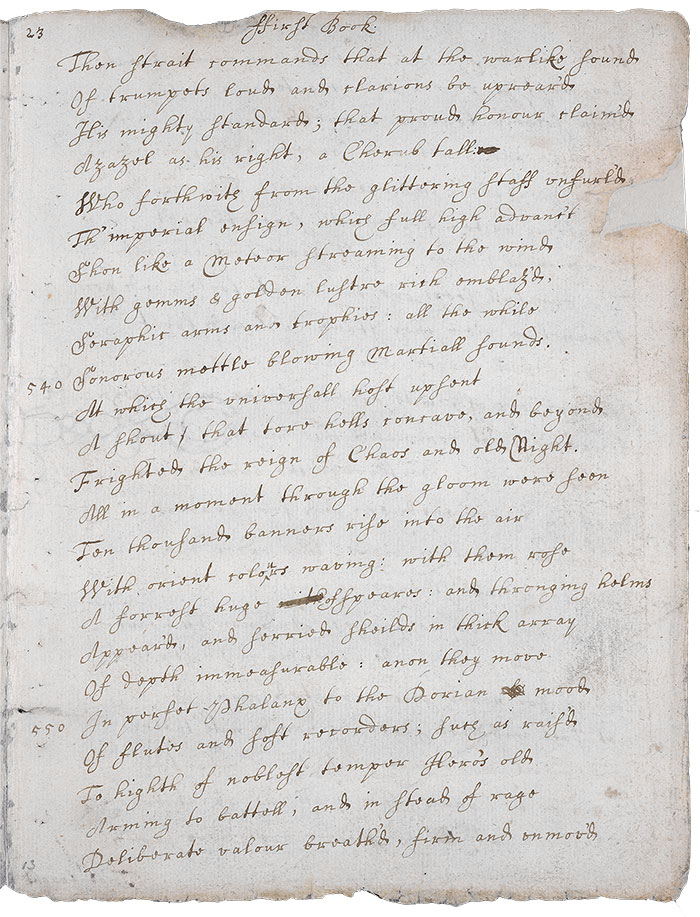
Paradise Lost.
Manuscript of Book I, in the hand of an amanuensis, ca. 1665.
Purchased by Pierpont Morgan, 1904
Then strait commands that at the warlike sound
Of trumpets loud and clarions be uprear'd
His mighty standard; that proud honour claim'd
Azazel as his right, a Cherube tall:
Who forthwith from the glittering staff unfurl'd
Th' imperial ensign, which full high advanc't
Shon like a Meteor streaming to the wind
With gemms & golden lustre rich emblaz'd,
Seraphic arms and trophies: all the while
Sonorous mettle blowing Martiall sounds.
At which the universall host upsent
A shout that tore hells concave, and beyond
Frighted the reign of Chaos and old Night.
All in a moment through the gloom were seen
Ten thousand banners rise into the air
With orient colours waving: with them rose
A forrest huge of speares: and thronging helms
Appear'd, and serried shields in thick array
Of depth immeasurable: anon they move
In perfet Phalanx to the Dorian mood
Of flutes and soft recorders; such as rais'd
To highth of noblest temper Hero's old
Arming to battell, and in stead of rage
Deliberate valour breath'd, firm and unmov'd
Paradise Lost. Manuscript of Book I, in the hand of an amanuensis, ca. 1665.
Folio 13v
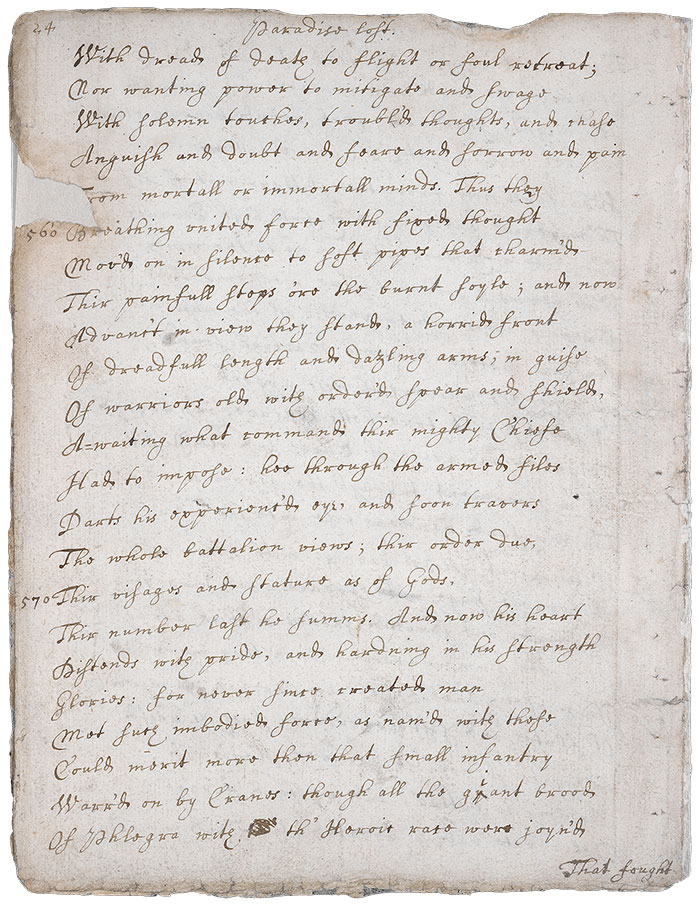
Paradise Lost.
Manuscript of Book I, in the hand of an amanuensis, ca. 1665.
Purchased by Pierpont Morgan, 1904
With dread of death to flight or foul retreat;
Nor wanting power to mitigate and swage
With solemn touches, troubl'd thoughts, and chase
Anguish and doubt and feare and sorrow and pain
From mortall or immortall minds. Thus they
Breathing united force with fixed thought
Mov'd on in silence to soft pipes that charm'd
Thir painfull steps o're the burnt soyle; and now
Advanc't in view they stand, a horrid front
Of dreadfull length and dazling arms, in guise
Of warriors old with order'd spear and shield,
A-waiting what command thir mighty Chiefe
Had to impose: hee through the armed files
Darts his experienc'd eye, and soon travers
The whole battalion views; thir order due,
Thir visages and stature as of Gods,
Thir number last he summs. And now his heart
Distends with pride, and hardning in his strength
Glories: for never since created man,
Met such imbodied force, as nam'd with these
Could merit more then that small infantry
Warr'd on by Cranes: though all the giant brood
Of Phlegra with th' Heroic race were joyn'd
Paradise Lost. Manuscript of Book I, in the hand of an amanuensis, ca. 1665.
Folio 14r
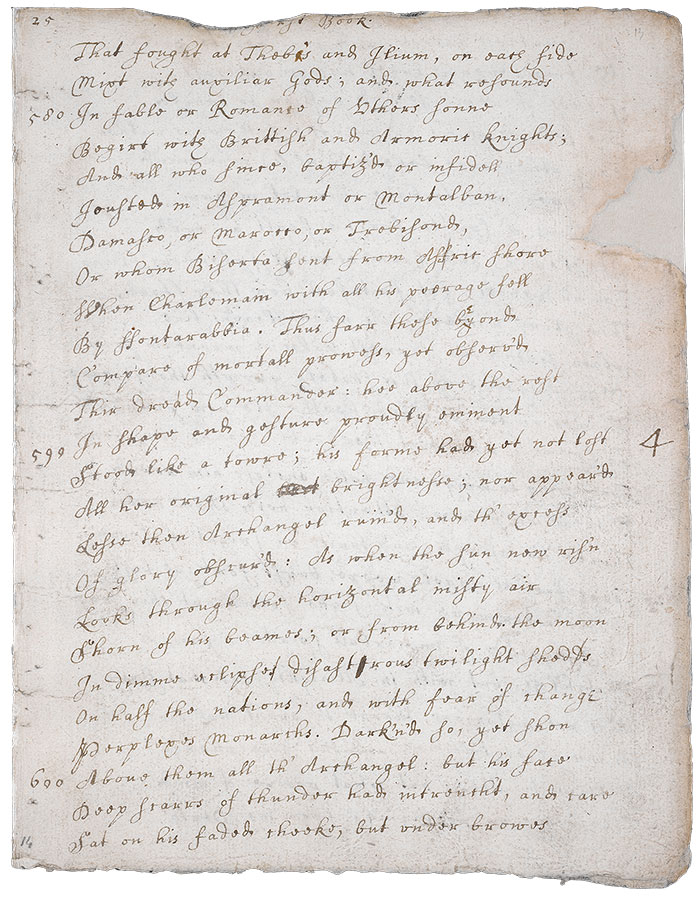
Paradise Lost.
Manuscript of Book I, in the hand of an amanuensis, ca. 1665.
Purchased by Pierpont Morgan, 1904
That fought at Theb's and Ilium, on each side
Mixt with auxiliar Gods; and what resounds
In fable or Romance of Uthers sonne
Begirt with Brittish and Armoric knights;
And all who since, baptiz'd or infidell
Jousted in Aspramont or Montalban,
Damasco, or Marocco, or Trebisond,
Or whom Biserta sent from Afric shore
When Charlemain with all his peerage fell
By Fontarabbia. Thus farr these beyond
Compare of mortal prowess, yet observ'd
Thir dred Commander: hee above the rest
In shape and gesture proudly eminent
Stood like a towre; his forme had yet not lost
All her original brightnesse, nor appear'd
Lesse then Archangel ruin'd, and th' excess
Of glory obscur'd: As when the sun new ris'n
Looks through the horizontal misty air
Shorn of his beames; or from behind the moon
In dimme eclipse disastrous twilight sheds
On half the nations, and with fear of change
Perplexes Monarchs. Dark'n'd so, yet shon
Above them all th' Archangel: but his face
Deep scarrs of thunder had intrench't, and care
Sat on his faded cheeke, but under browes
Paradise Lost. Manuscript of Book I, in the hand of an amanuensis, ca. 1665.
Folio 14v
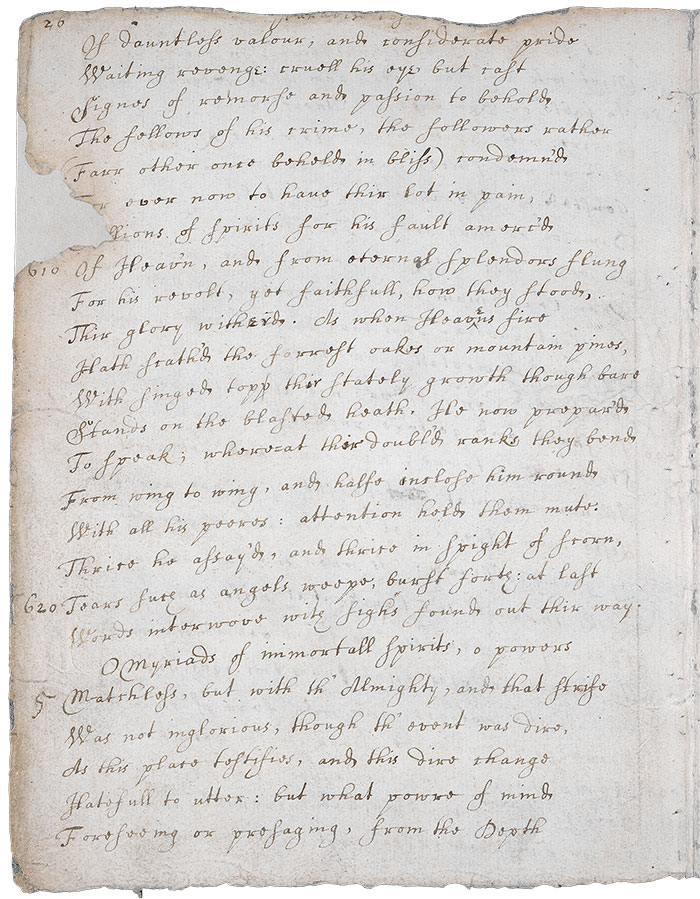
Paradise Lost.
Manuscript of Book I, in the hand of an amanuensis, ca. 1665.
Purchased by Pierpont Morgan, 1904
Of dauntless valour, and considerate pride
Waiting revenge: cruell his eye, but cast
Signes of remorse and passion to behold
The fellows of his crime, the followers rather
(Farr other once beheld in bliss) condemn'd
For ever now to have thir lot in pain,
[Mi]llions of spirits for his fault amerc'd
Of Heav'n, and from eternal splendors flung
For his revolt, yet faithfull how they stood,
Thir glory witherd. As when Heavens fire
Hath scath'd the forrest oakes, or mountain pines,
With singed top thir stately growth though bare
Stands on the blasted heath. He now prepar'd
To speak; where-at their doubl'd ranks they bend
From wing to wing, and halfe inclose him round
With all his peeres: attention held them mute.
Thrice he assay'd, and thrice in spite of scorn,
Tears such as angels weepe, burst forth: at last
Words interwove with sighs found out thir way.
O Myriads of immortall spirits, o powers
Matchless, but with th' Almighty, and that strife
Was not inglorious, though th' event was dire,
As this place testifies, and this dire change
Hatefull to utter: but what powre of mind
Foreseeing or presaging, from the Depth
Paradise Lost. Manuscript of Book I, in the hand of an amanuensis, ca. 1665.
Folio 15r
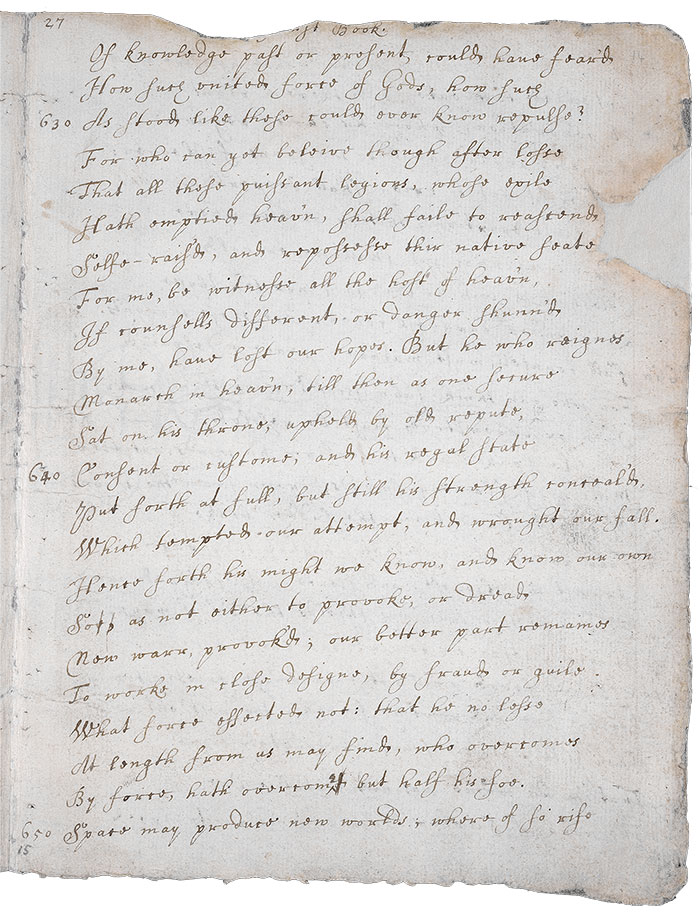
Paradise Lost.
Manuscript of Book I, in the hand of an amanuensis, ca. 1665.
Purchased by Pierpont Morgan, 1904
Of knowledge past or present, could have fear'd,
How such united force of Gods, how such
As stood like these could ever know repulse?
For who can yet beleive, though after losse,
That all these puissant legions, whose exile
Hath emptied heav'n, shall faile to reascend
Selfe-rais'd, and repossesse thir native seate
For me, be witnesse all the host of heav'n,
If counsells different, or danger shunn'd
By me, have lost our hopes. But he who reignes
Monarch in heav'n, till then as one secure
Sat on his throne, upheld by old repute,
Consent or custome; and his regal state
Put forth at full, but still his strength conceal'd,
Which tempted our attempt, and wrought our fall.
Hence forth his might we know, and know our own
So as not either to provoke, or dread
New warr, provok'd; our better part remaines
To worke in close designe, by fraud or guile
What force effected not: that he no lesse
At length from us may find, who overcomes
By force, hath overcome but half his foe.
Space may produce new worlds; where of so rife
Paradise Lost. Manuscript of Book I, in the hand of an amanuensis, ca. 1665.
Folio 15v
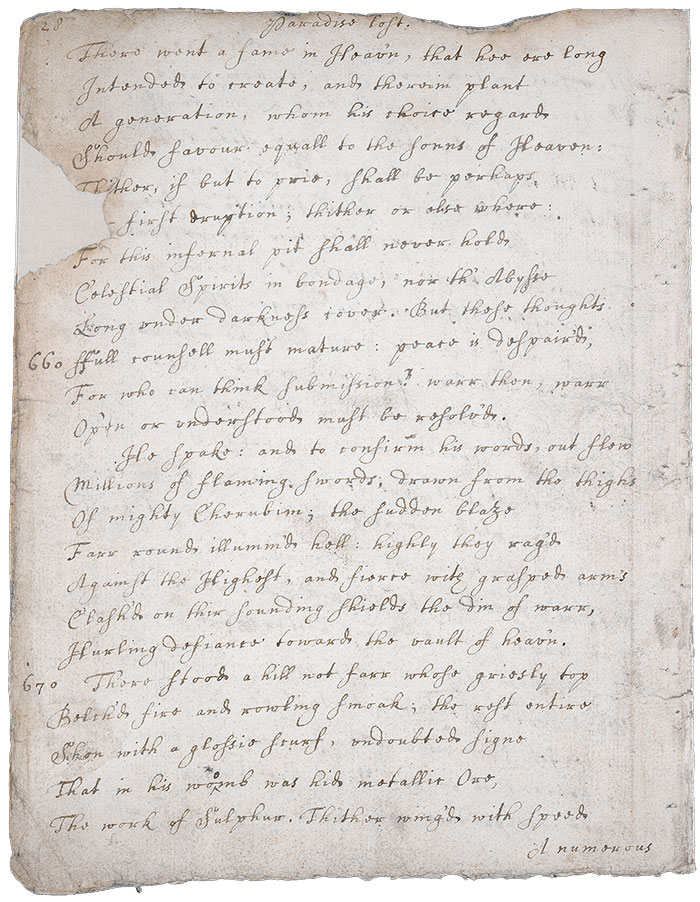
Paradise Lost.
Manuscript of Book I, in the hand of an amanuensis, ca. 1665.
Purchased by Pierpont Morgan, 1904
There went a fame in Heav'n, that hee ere long
Intended to create, and therein plant
A generation, whom his choice regard
Should favour equall to the sonns of Heaven:
Thither, if but to prie, shall be perhaps
[ ]r first eruption; thither or else where:
For this infernal pit shall never hold
Celestial Spirits in bondage, nor th' Abysse
Long under darkness cover. But these thoughts
Full counsell must mature: peace is despair'd,
For who can think submission? warr then, warr
Op'n or understood must be resolv'd.
He spake: and to confirm his words, out flew
Millions of flaming swords, drawn from the thighs
Of mighty Cherubim; the sudden blaze
Farr round illumin'd hell: highly they rag'd
Against the Highest, and fierce with grasped arm's
Clash'd on thir sounding shields the din of warr,
Hurling defiance toward the vault of heav'n.
There stood a hill not farr whose griesly top
Belch'd fire and rowling smoak; the rest entire
Shon with a glossie scurf, undoubted signe
That in his woomb was hid metallic Ore,
The work of Sulphur. Thither wing'd with speed
Paradise Lost. Manuscript of Book I, in the hand of an amanuensis, ca. 1665.
Folio 16r
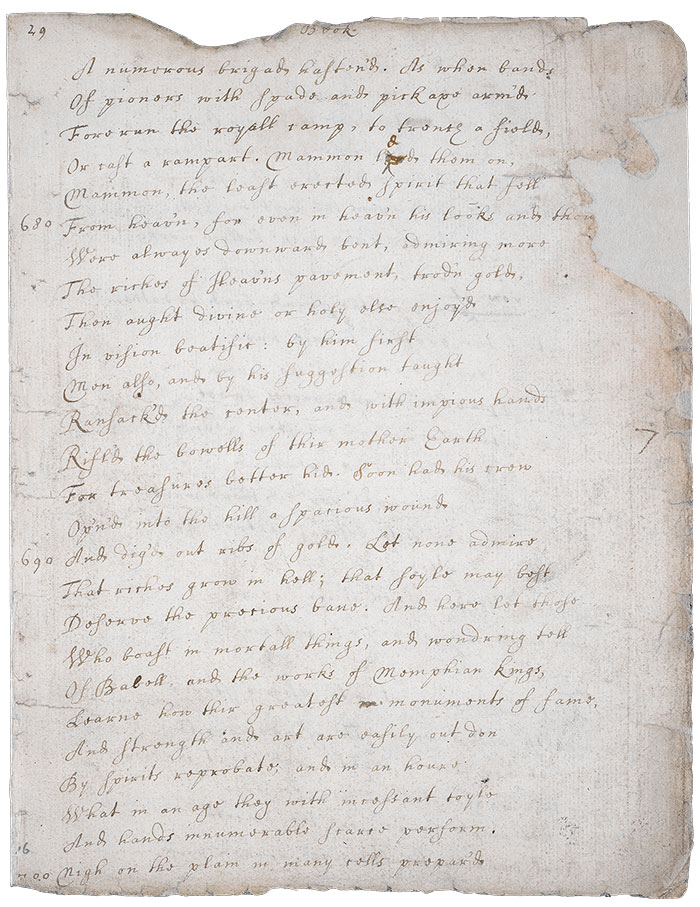
Paradise Lost.
Manuscript of Book I, in the hand of an amanuensis, ca. 1665.
Purchased by Pierpont Morgan, 1904
A numerous brigad hasten'd. As when bands
Of pioners with spade and pickaxe arm'd
Forerun the royall camp, to trench a field,
Or cast a rampart. Mammon led them on,
Mammon, the least erected spirit that fell
From heav'n, for even in heav'n his looks & thou[ ]
Were alwayes downward bent, admiring more
The riches of Heav'ns pavement, trod'n gold,
Then aught divine or holy else enjoy'd
In vision beatific: by him first
Men also, and by his suggestion taught
Ransack'd the center, and with impious hands
Rifl'd the bowells of thir mother Earth
For treasures better hid. Soon had his crew
Op'n'd into the hill a spacious wound
And dig'd out ribs of gold. Let none admire
That riches grow in hell; that soyle may best
Deserve the precious bane. And here let those
Who boast in mortall things, and wondring tell
Of Babell, and the works of Memphian kings,
Learne how thir greatest monuments of fame,
And strength and art are easily outdon
By spirits reprobate, and in an houre
What in an age they with incessant toyle
And hands innumerable scarce perform.
Nigh on the plain in many cells prepar'd
Paradise Lost. Manuscript of Book I, in the hand of an amanuensis, ca. 1665.
Folio 16v
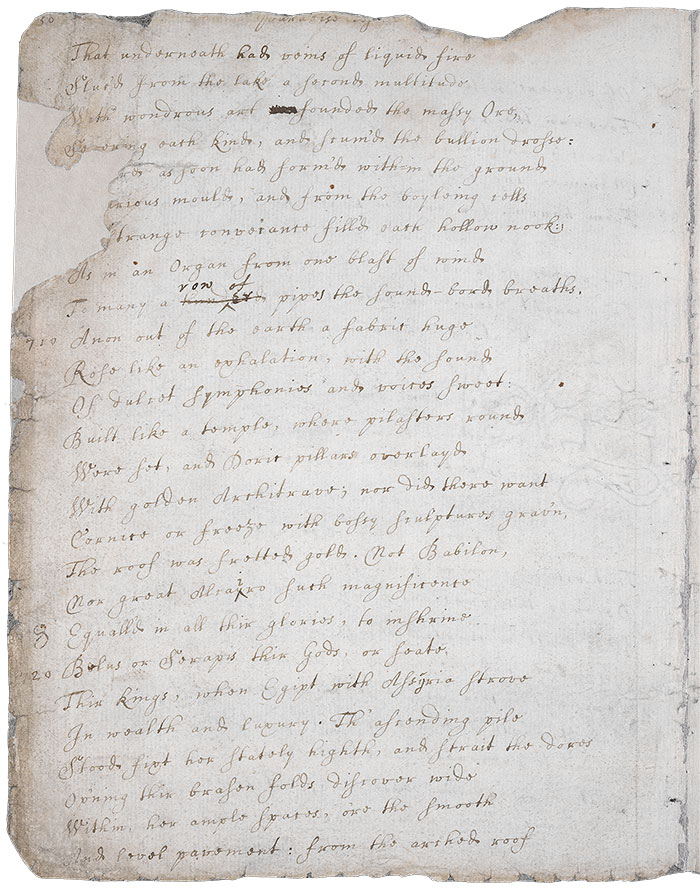
Paradise Lost.
Manuscript of Book I, in the hand of an amanuensis, ca. 1665.
Purchased by Pierpont Morgan, 1904
That underneath had veins of liquid fire
Sluc'd from the lake a second multitude
With wondrous art founded the massy Ore,
Severing each kind, and scum'd the bullion drosse:
[ ]rd as soon had form'd within the ground
[ ]arious mould, and from the boyleing cells
[ ] strange conveiance fill'd each hollow nook:
As in an Organ from one blast of wind
To many a row of pipes the sound-bord breaths.
Anon out of the earth a fabric huge
Rose like an exhalation, with the sound
Of dulcet symphonies and voices sweet:
Built like a temple, where pilasters round
Were set, and Doric pillars overlayd
With golden Architrave; nor did there want
Cornice or freeze with bossy sculptures grav'n,
The roof was fretted gold. Not Babilon,
Nor great Alcairo such magnificence
Equall'd in all thir glories, to inshrine
Belus or Serapis thir Gods, or seate
Thir kings, when Egipt with Assyria strove
In wealth and luxury. Th' ascending pile
Stood fixt her stately highth, and strait the dores
Op'ning thir brasen folds discover wide
Within, her ample spaces, o're the smooth
And level pavement: from the arched roof
Paradise Lost. Manuscript of Book I, in the hand of an amanuensis, ca. 1665.
Folio 17r
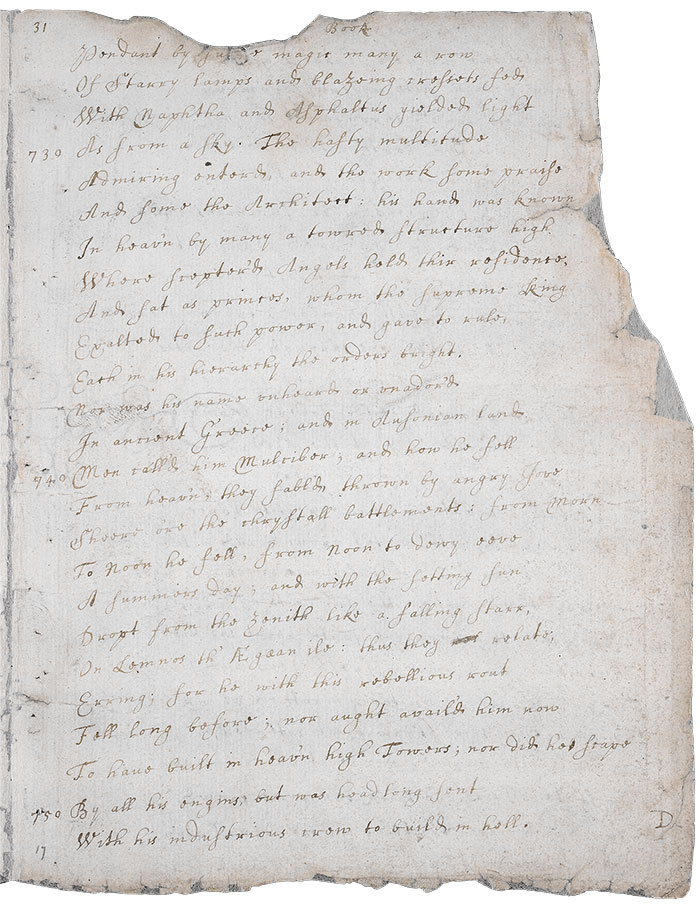
Paradise Lost.
Manuscript of Book I, in the hand of an amanuensis, ca. 1665.
Purchased by Pierpont Morgan, 1904
Pendant by su[ ]e magic many a row
Of Starry lamps and blazeing cressets fed
With Naphtha and Asphaltus yielded light
As from a sky. The hasty multitude
Admiring enterd, and the work some praise
And some the Architect: his hand was known
In heav'n by many a towred structure high
Where scepter'd Angels held thir residence,
And sat as princes, whom the supreme King
Exalted to such power, and gave to rule,
Each in his hierarchy the orders bright.
Nor was his name unheard or unador'd
In ancient Greece; and in Ausonian land
Men call'd him Mulciber; and how he fell
From heav'n, they fabl'd, thrown by angry Jove
Sheere o're the chrystall battlements: from Morn
To Noon he fell, from Noon to dewy eeve
A summers day; and with the setting sun
Dropt from the zenith like a falling starr,
On Lemnos th' Ægæan ile: thus they relate,
Erring; for he with this rebellious rout
Fell long before; nor aught avail'd him now
To have built in heav'n high Towers; nor did he scape
By all his engins, but was headlong sent
With his industrious crew to build in hell.
Paradise Lost. Manuscript of Book I, in the hand of an amanuensis, ca. 1665.
Folio 17v
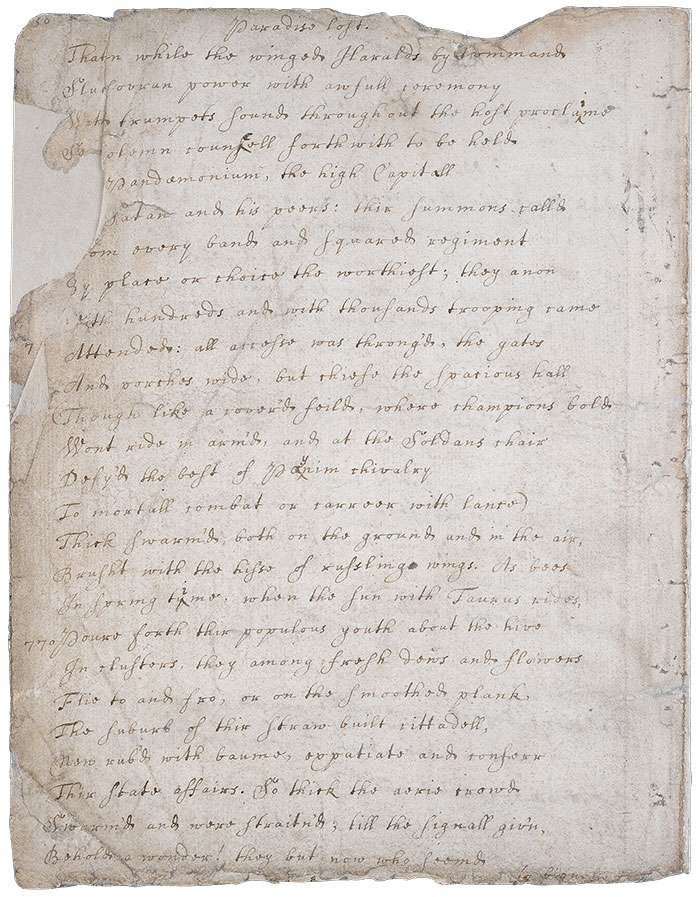
Paradise Lost.
Manuscript of Book I, in the hand of an amanuensis, ca. 1665.
Purchased by Pierpont Morgan, 1904
[ ]n while the winged Haralds by [ ]mmand
[ ] sovran power, with awfull ceremony
[ ] trumpets sound throughout the host proclaime
[ ]olemn councell forthwith to be held
[ ] Pandæmonium, the high Capitall
[ ] Satan and his peers: thir summons call'd
[ ]om every band and squared regiment
By place or choice the worthiest; they anon
[ ]ith hundreds and with thousands trooping came
Attended: all accesse was throng'd, the gates
And porches wide, but chiefe the spacious hall
(Though like a cover'd feild, where champions bold
Wont ride in arm'd, and at the Soldans chair
Defy'd the best of Paynim chivalry
To mortall combat or carreer with lance)
Thick swarm'd, both on the ground and in the air,
Brusht with the hisse of russling wings. As bees
In spring time, when the sun with Taurus rides,
Poure forth thir populous youth about the hive
In clusters, they among fresh dews and flowers
Flie to and fro, or on the smoothed plank,
The suburb of thir straw built cittadell,
New rub'd with baume, expatiate and conferr
Thir state affairs. So thick the aerie crowd
Swarm'd and were straitn'd; till the signall giv'n
Behold a wonder! they but now who seemd
Paradise Lost. Manuscript of Book I, in the hand of an amanuensis, ca. 1665.
Folio 18r
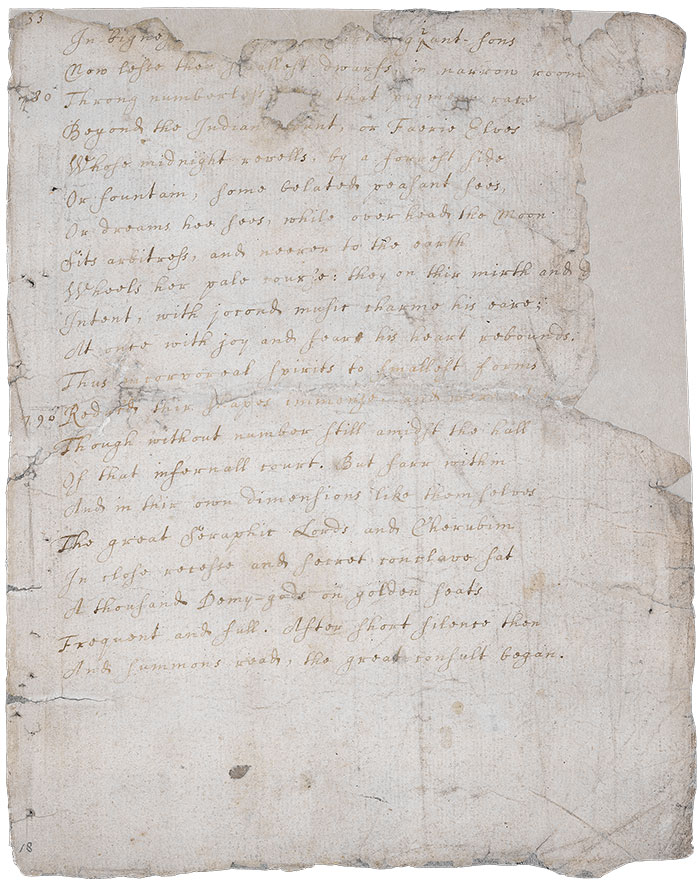
Paradise Lost.
Manuscript of Book I, in the hand of an amanuensis, ca. 1665.
Purchased by Pierpont Morgan, 1904
In bigness [ ] giant-sons
Now lesse then smallest dwarfs, in narrow room
Throng numberless [ ] that pigmean race
Beyond the Indian mount, or Faerie Elves
Whose midnight revells, by a forrest side
Or fountain, some belated peasant sees,
Or dreams hee sees, while over head the Moon
Sits arbitress, and neerer to the earth
Wheels her pale course: they on thir mirth & d[ ]
Intent, with jocond music charme his eare;
At once with joy and fear his heart rebounds.
Thus incorporeal spirits to smallest forms
Reduc'd thir shapes immense, and were at l[ ]
Though without number still amidst the hall
Of that infernall court. But farr within
And in thir own dimensions like themselves
The great Seraphic Lords and Cherubim
In close recesse and secret conclave sat
A thousand Demy-gods on golden seat's
Frequent and full. After short silence then
And summons read, the great consult began.
Paradise Lost. Manuscript of Book I, in the hand of an amanuensis, ca. 1665.
Related Items, Signature
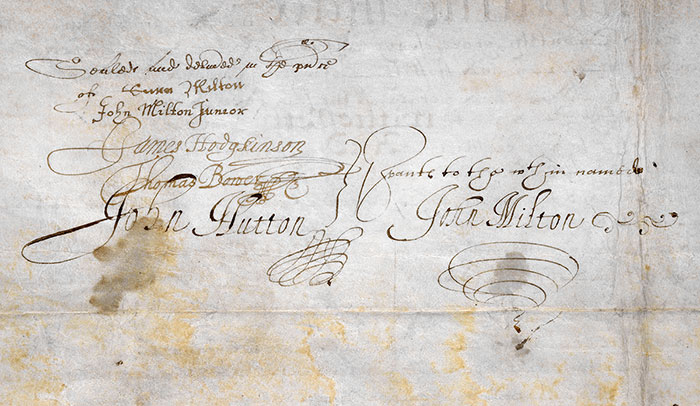
Paradise Lost.
Signature on tri-party marriage indenture, 27 November 1623.
Purchased by J.P. Morgan, Jr., 1919
1668 Edition
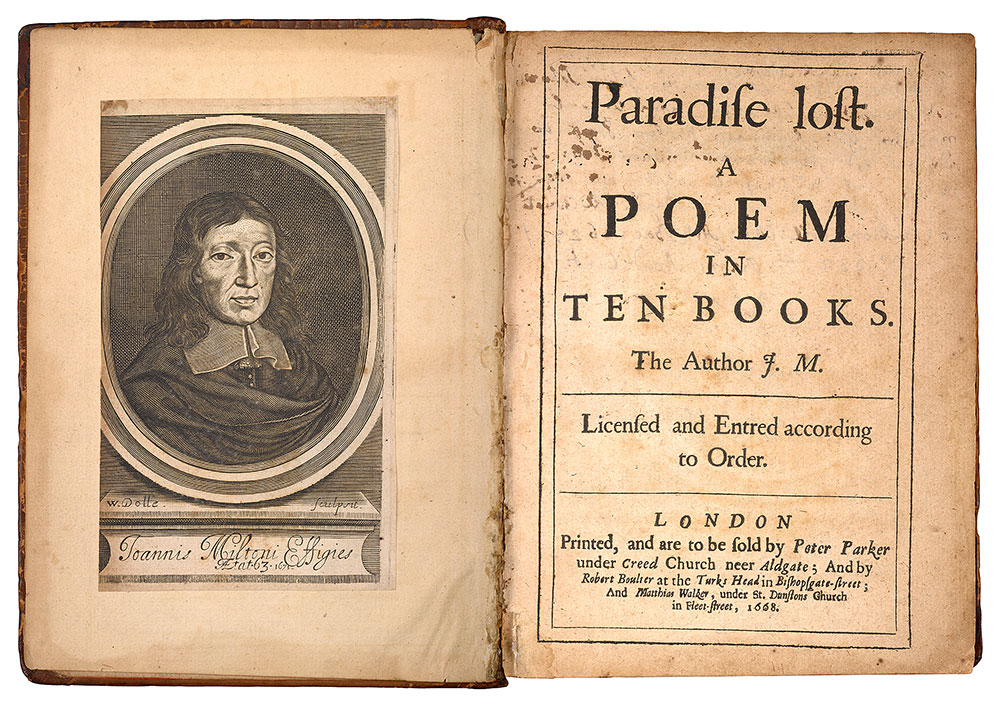
Paradise Lost.
London: Printed, and are to be sold by Peter Parker under Creed Church neer Aldgate; and by Robert Boulter at theTurks Head in Bishopsgate-street; and Matthias Walker, under St. Dunstons Church in Fleet-street, 1668.
Purchased by Pierpont Morgan, 1912
The bibliographer Hugh Amory argues persuasively for this being the earliest issue of the first edition of Paradise Lost (despite its title page, dated 1668), in which the anonymous author is identified only by his initials, "J. M." Similarly, the author is identified in the Stationers' Register on 20 August 1667 by his initials only. Amory speculates that Samuel Simmons, the printer and publisher of the first edition, decided against using Milton's full name on the title page "as the day of publication approached," substituting this version on which the author remained anonymous. Simmons's faltering confidence is understandable because Milton, a prominent supporter of regicide (he defended the execution of Charles I), was still widely regarded as a dangerous radical when Paradise Lost was first published.
1667 Edition
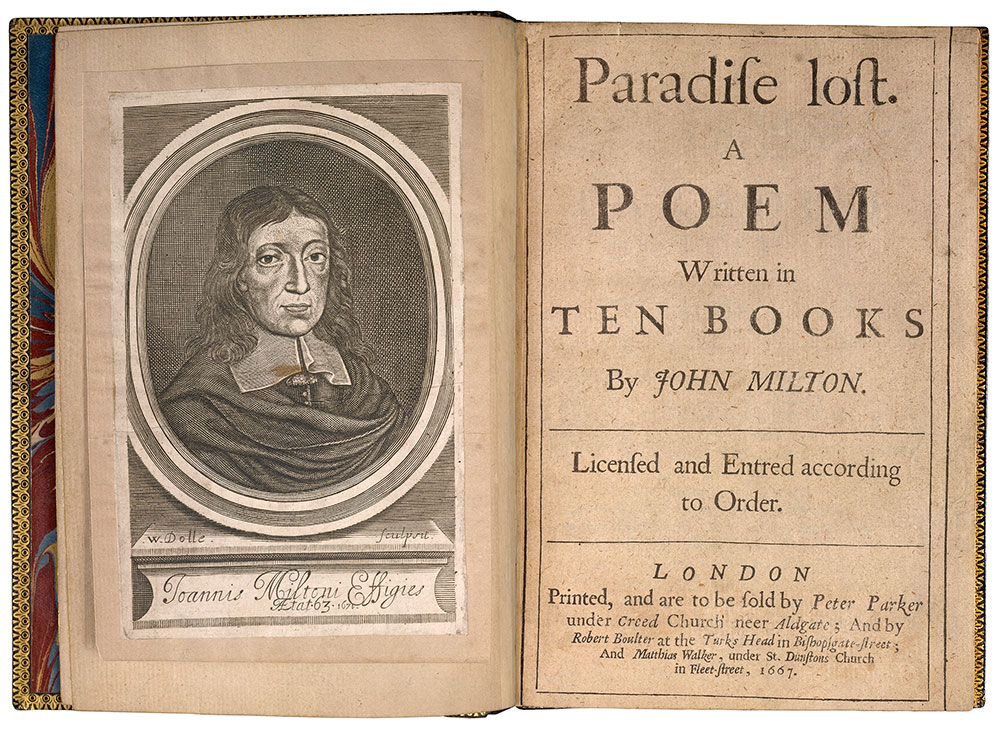
Paradise Lost.
London: Printed, and are to be sold by Peter Parker under Creed Church neer Aldgate; and by Robert Boulter at the Turks Head in Bishopsgate-street; and Matthias Walker,under St. Dunstons Church in Fleet-street, 1667.
Purchased by Pierpont Morgan
As sales of the book improved, and perhaps after the royal library had accepted a presentation copy (the king's copy is displayed in the next case), Simmons's anxiety subsided, and he began to draw from the stock of alternative title pages. Milton's full name was retained on the title pages of the first edition in 1668 and 1669. The book was never issued with a frontispiece portrait of the author. The portrait that appears opposite the title pages of these copies is William Dolle's engraving (after William Faithorne's painting of Milton), published in the second and third editions (1674 and 1678), and inserted into these copies of the first edition at a later date.
Book 1
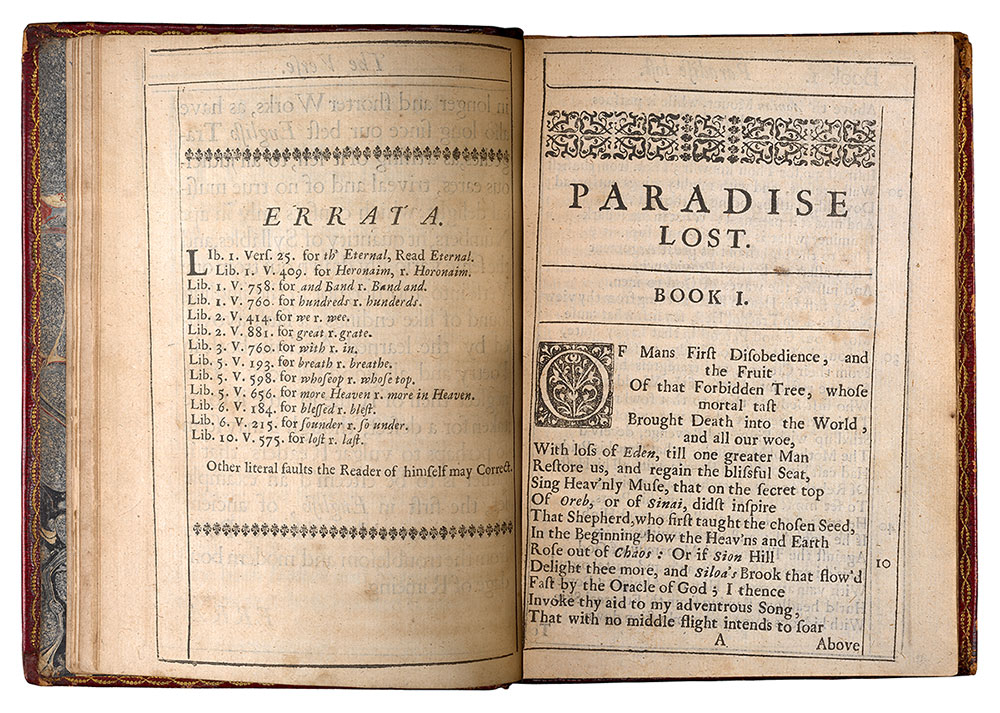
Paradise Lost.
Licensed and Entred [sic] according to Order. London: Printed [by Samuel Simmons], and are to be sold by Peter Parker under Creed Church neer Aldgate; And by Robert Boulter at the Turks Head in Bishopsgate-street; and Matthias Walker, under St. Dunstons Church in Fleet-street, 1667.
Purchased by Pierpont Morgan
1668 Edition
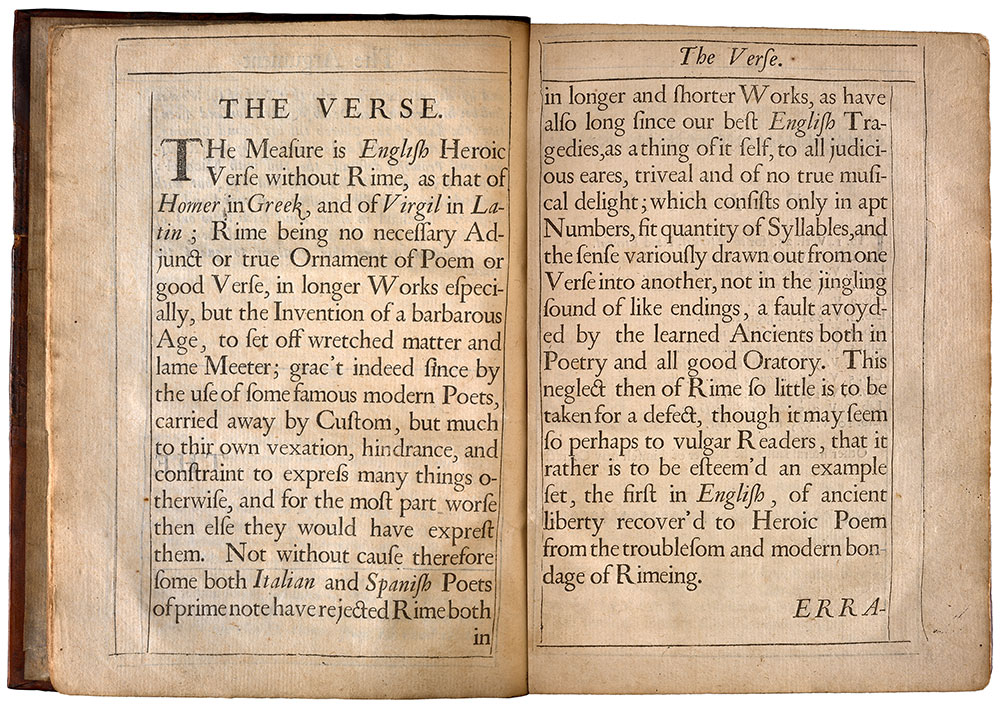
Paradise Lost. A Poem in Ten Books. The Author / John Milton.
London: Printed by S. Simmons, and to be sold by S. Thomsonat the Bishops-Head in Duck-lane, H. Mortlack at the WhiteHart in Westminster Hall, M. Walker under St. Dunstans Church in Fleet-street, and R. Boulter at the Turks-Head inBishopsgate street, 1668.
Gift of Dr. Karl Vogel, 1957
This 1668 reissue was the first to include Milton's synopsis of each book ("the Arguments" of Books 1–10), his defense of "the Verse," and a list of errata, adding sixteen pages of preliminary matter to the book. Simmons's note to the reader states that he had procured this explanation from Milton because readers of the poem had "stumbled" on first encountering it, asking "why the Poem Rimes not." Milton's strident defense of blank verse (unrhymed iambic pentameter) is printed in large type that fills two pages. His chosen meter, although no longer fashionable by 1667, was the dominant mode of Shakespeare's plays and is the closest to the natural rhythms of English speech. Samuel Johnson later commented sarcastically that, "finding blank verse easier than rhyme, [Milton] was desirous of persuading himself that it is better."
Charles II Copy
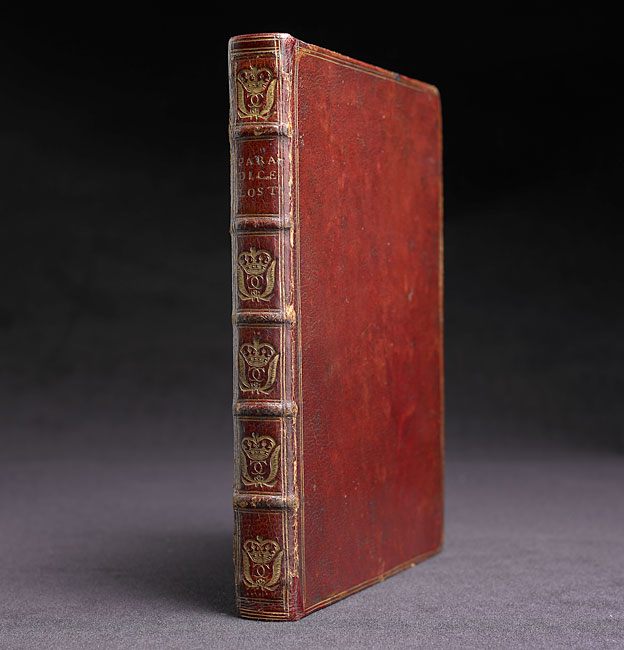
Paradise Lost. A Poem in Ten Books. The Author John Milton.
London: Printed by S. Simmons, and to be sold by S. Thomsonat the Bishops-Head in Duck-lane, H. Mortlack at the WhiteHart in Westminster Hall, M. Walker under St. DunstansChurch in Fleet-street, and R. Boulter at the Turks-Head inBishopsgate street, 1668..
Gift of Caroline Newton, 1970
When Charles II was restored to the English throne in 1660, he issued a proclamation calling for two of Milton's books to be publicly burned by the hangman. This is a magnificent association copy, bound in full contemporary red morocco and stamped in gilt with the cipher of Charles II, consisting of crowned Cs and palm leaves in five of the six spine panels. The endpapers also bear a watermark with the arms of Charles II. The royal binding is attributed to Samuel Mearne. The gilt stamped spine reads Paradice Lost, the title as it was entered in the Stationers' Register on 20 August 1667. This copy has the 1667 title page bound, as printed, at the end.
1777 Edition
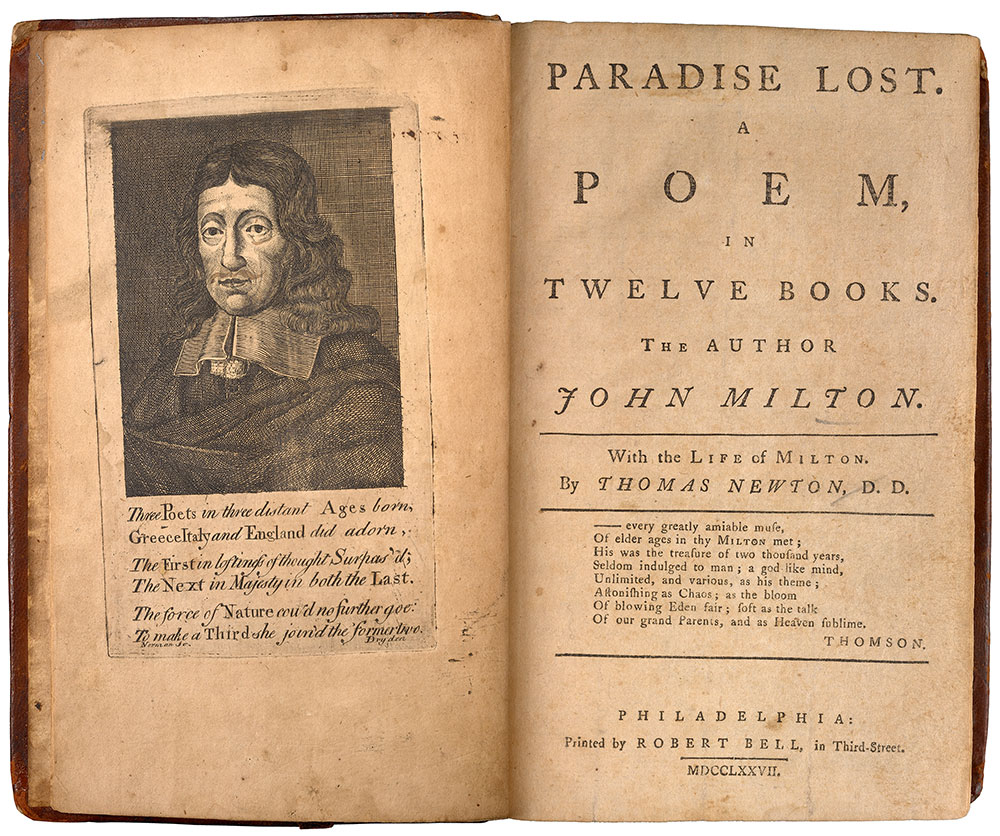
Paradise Lost: A poem, in Twelve Books. The Author John Milton. With the life of Milton. By Thomas Newton,D.D. [Eight lines from Thomson]
Philadelphia: Printed by Robert Bell, in Third-Street, 1777.Vol. I.
Purchased by Pierpont Morgan, 1911
Over a century after the first publication of Paradise Lost in London, the Philadelphia printer Robert Bell, perhaps inspired by the Revolution, ignored British copyright and published this two-volume edition of Milton's work. This is the extremely rare first American edition, in contemporary sheep binding with a frontispiece portrait engraving by John Norman, to which a previous owner has added a moustache in ink. Milton had long enjoyed a high reputation in this country. Thomas Jefferson, like many of his contemporaries, regarded Milton as one of the greatest poets of the English language. In his essay "Thoughts on English Prosody," he declared blank verse to be "the most precious part of our poetry," citing the opening of Paradise Lost as an example.
Areopagitica
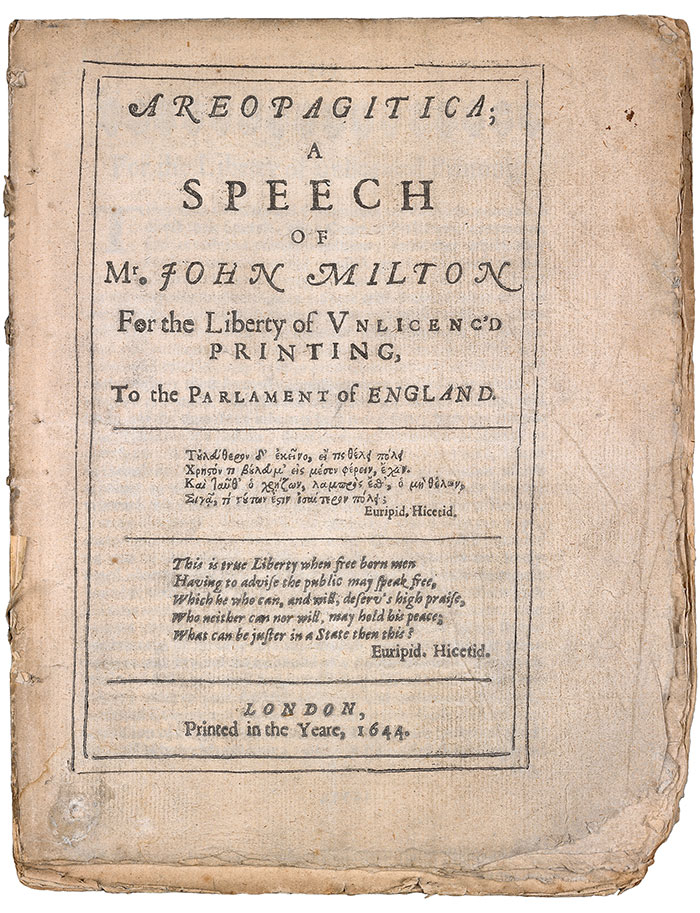
Areopagitica; A Speech of Mr. John Milton For the Liberty of Vnlicenc'd Printing, To the Parlement of England. London, Printed in the Yeare, 1644.
Purchased by Pierpont Morgan
Galileo, p. 1
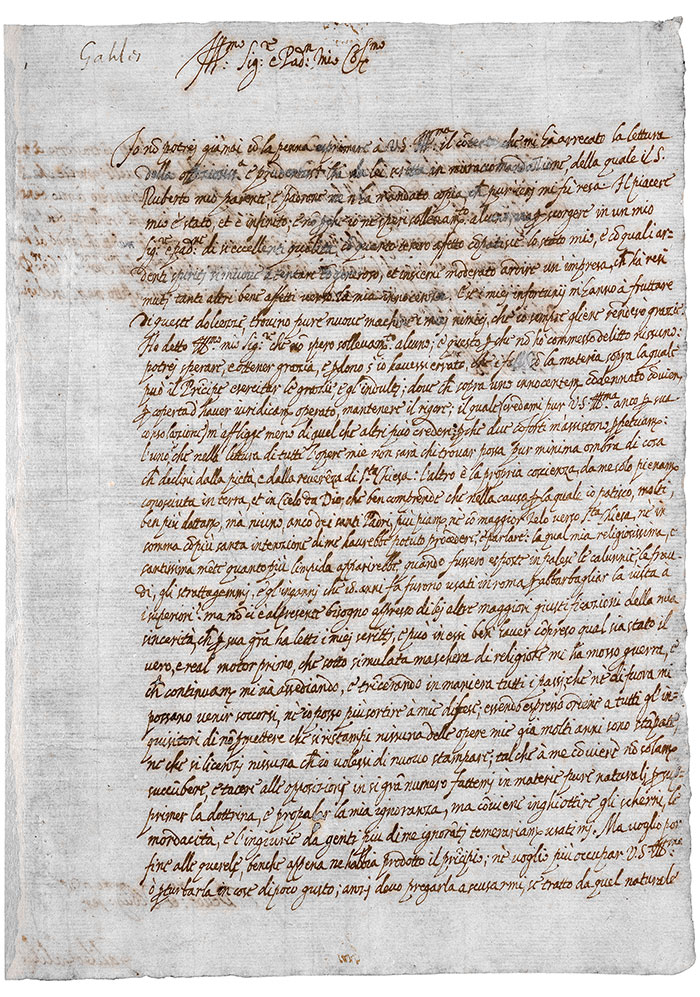
Autograph letter signed, Arcetri, to Nicholas Fabri de Peiresc, 21 February , 1635.
Purchased by J.P. Morgan, Jr., 1928
Galileo, p. 2
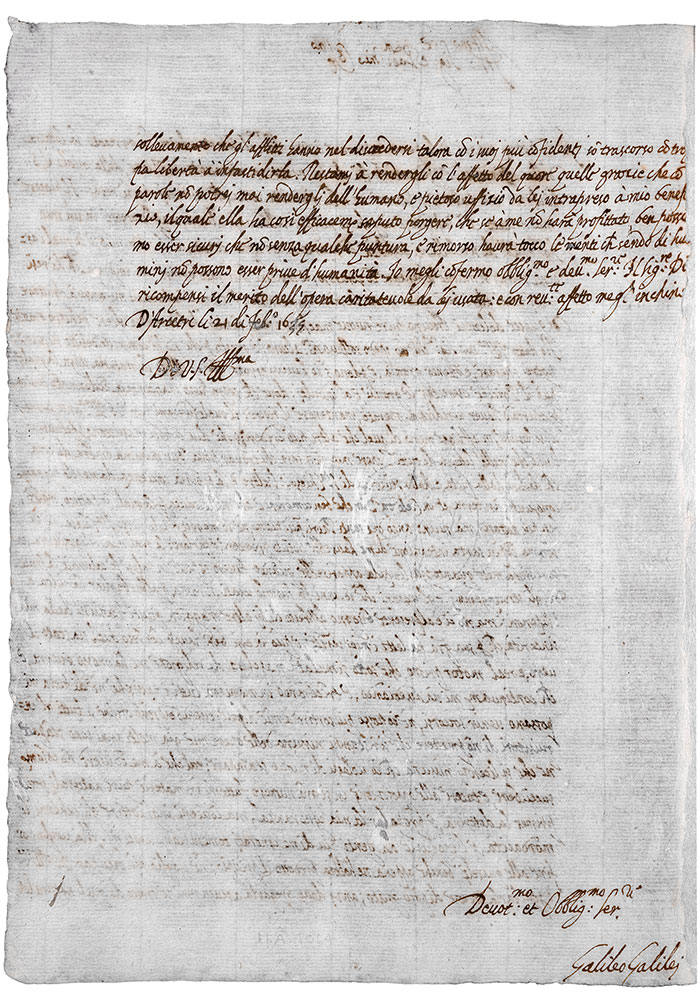
Autograph letter signed, Arcetri, to Nicholas Fabri de Peiresc, 21 February , 1635.
Purchased by J.P. Morgan, Jr., 1928
A Proclamation
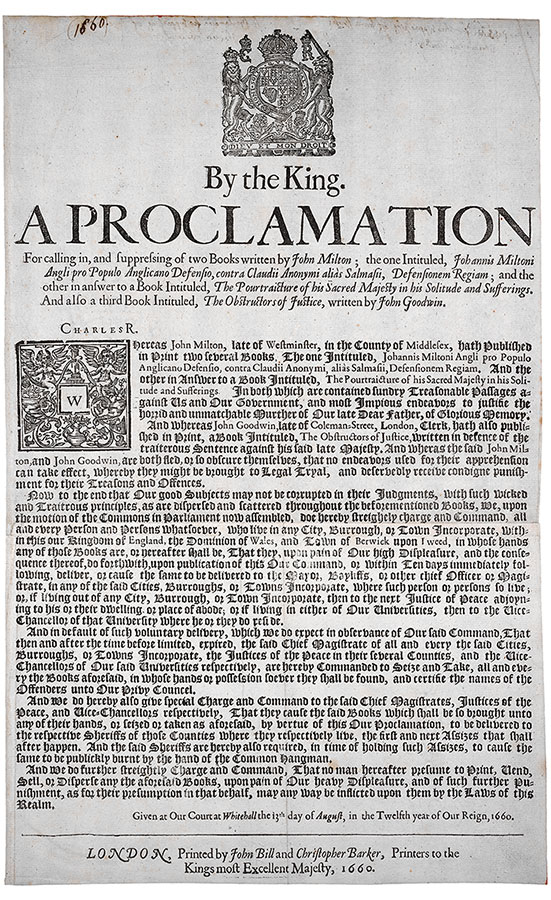
By the King. A proclamation for calling in and suppressing of two books written by John Milton: the one intituled, Johannis Miltoni Angli pro populo Anglicano defensio, contra Claudii Anonymi alias Salmasii, defensionem regiam, and the other in answer to a book intituled, The pourtraicture of His Sacred Majesty in his solitude and sufferings: and also a third book intituled, The obstructors of justice, written by John Goodwin / by the King.
London : Printed by John Bill and Christopher Barker, Printers to the Kings most Excellent Majesty, 1660.
Purchased by Pierpont Morgan, 1910
Defensio
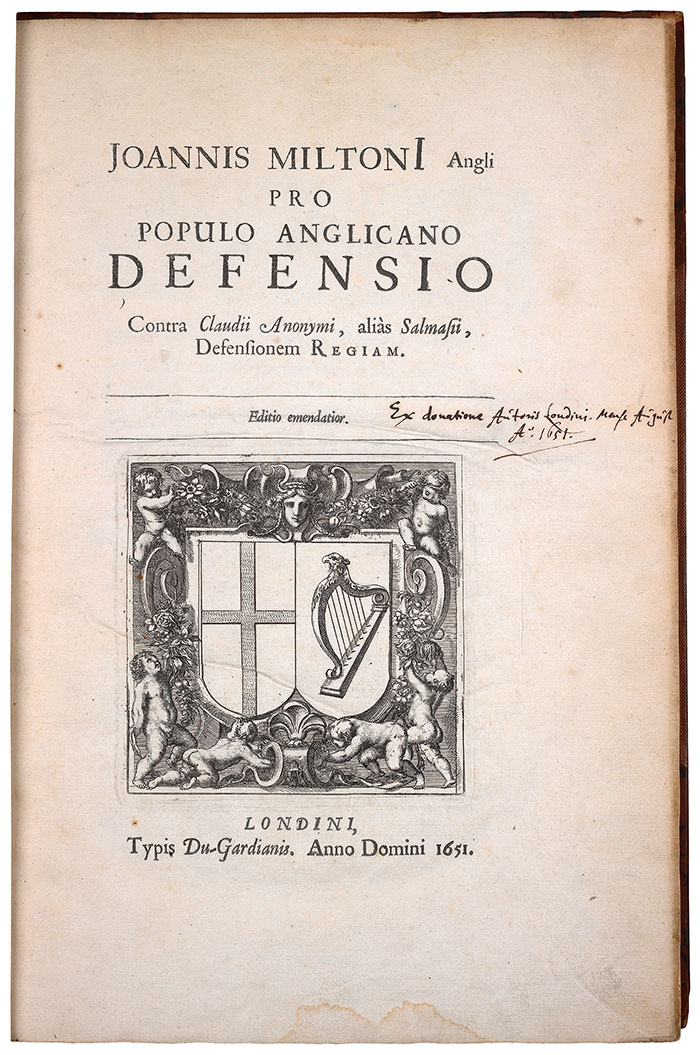
Joannis Miltoni Angli Pro populo Anglicano defensio: contra Claudii Anonymi, alias Salmasii, Defensionem regiam. Londini: Typis Du-Gardianis, Anno Domini 1651.
Purchased by Pierpont Morgan, 1910
1688 Edition
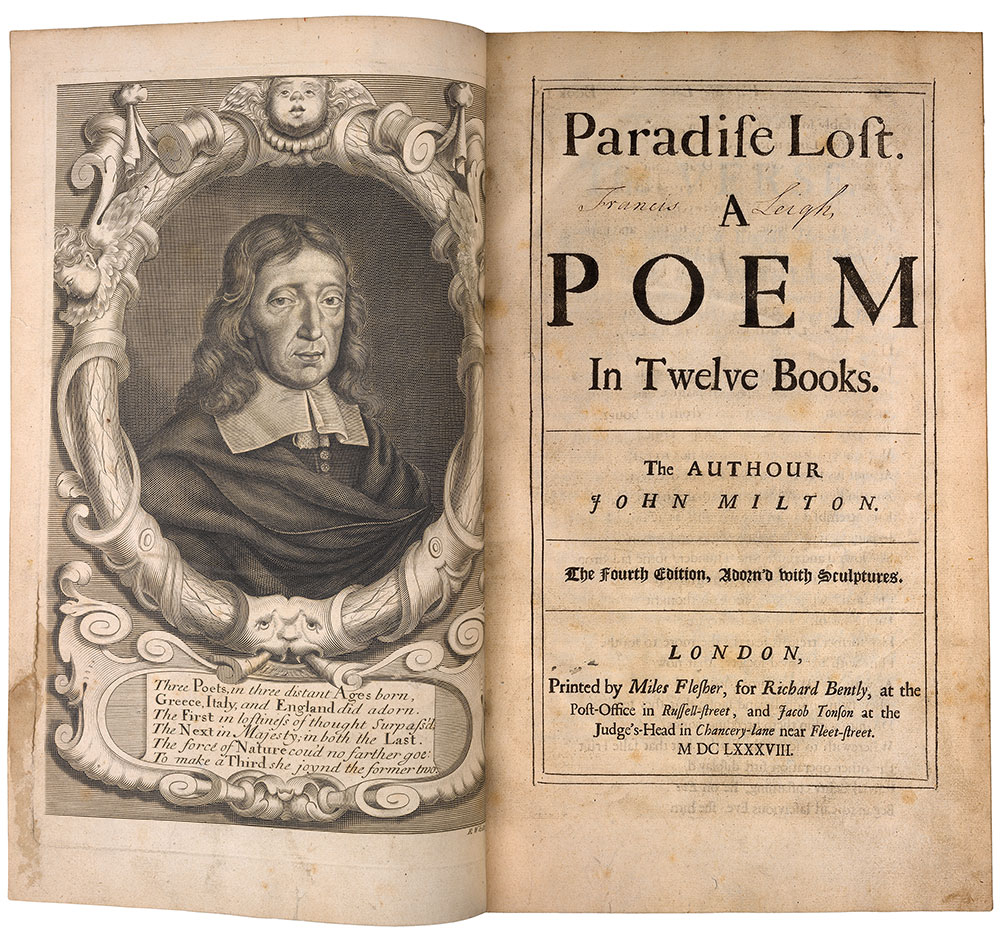
Paradise Lost. A Poem in Twelve Books. / the authour JohnMilton. The fourth edition, adorn'd with sculptures.
London: Printed by Miles Flesher, for Richard Bently,at the Post-Office in Russell-Street, and Jacob Tonson at theJudge's Head in Chancery-lane near Fleet-street, 1688.
Gift of George Blumenthal, 1941
By 1688, when England was on the verge of the Whig revolution, Milton's reputation had revived considerably. He was commended for his republicanism as well as his record as a defender of liberty. His supporters believed that his greatest poetic achievement merited this handsome, monumental edition. One of the earliest examples of subscription publishing, financed by Lord Somers, the fourth edition of Paradise Lost was the first to be printed in folio format and is the first illustrated edition, distinguished by high quality paper, large, clear type, and ample margins. Milton had previously reorganized the poem into twelve books (by splitting Books 7 and 10 of the original) to parallel Virgil's Aeneid more closely. Full-page illustrations by John Baptiste de Medina, Bernard Lens, and Henry Aldrich precede each of the twelve books in this edition.
1777 Edition
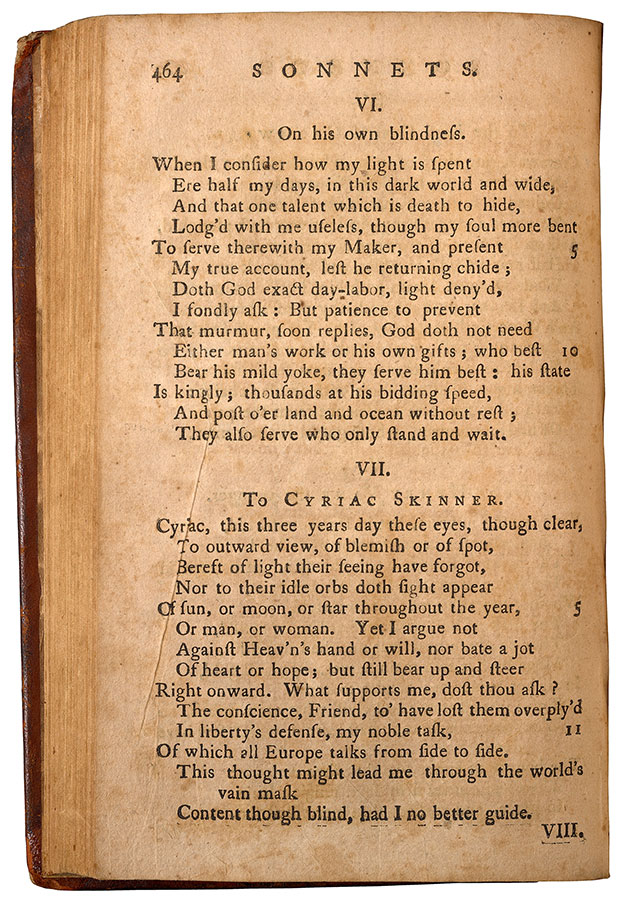
Paradise Lost: A poem, in Twelve Books. The Author /John Milton. With the life of Milton. By Thomas Newton,D.D. [Eight lines from Thomson]
Philadelphia: Printed by Robert Bell, in Third-Street, 1777.Vol. II.
Purchased by Pierpont Morgan, 1911
In Bell's edition, Milton's two sonnets on the subject of his blindness are printed together on one page. Sonnet 22 (here numbered VII) is a Petrarchan sonnet addressed to his pupil and friend, Cyriack Skinner (1627–1700). Written in late 1654 or early 1655, three years after Milton had become totally blind, it remained unpublished during Milton's lifetime. The manuscript is written in Skinner's hand, indicating that Milton dictated it to him. Both sonnets innovatively blur the distinction between the octave and sestet, continuing the syntax and sense between the eighth and ninth lines by enjambment to more closely approximate the natural rhythms of the speaking voice. This fluidity and continuity, in which, according to Milton's note, "the sense [is] variously drawn out from one verse into another," is also a notable element in the poetic accomplishment of Paradise Lost.
Cyriack, this three years day these eys, though clear
To outward view, of blemish or of spot;
Bereft of light, thir seeing have forgot,
Nor to thir idle orbs doth sight appear
Of Sun or Moon or Starre throughout the year,
Or man or woman. Yet I argue not
Against heavns hand or will, nor bate a jot
Of heart or hope; but still bear up and steer
Right onward. What supports me, dost thou ask?
The conscience, Friend, to have lost them overply'd
In libertyes defence, my noble task,
Of which all Europe talks from side to side.
This thought might lead me through the worlds vain mask
Content though blind, had I no better guide.
Miniature
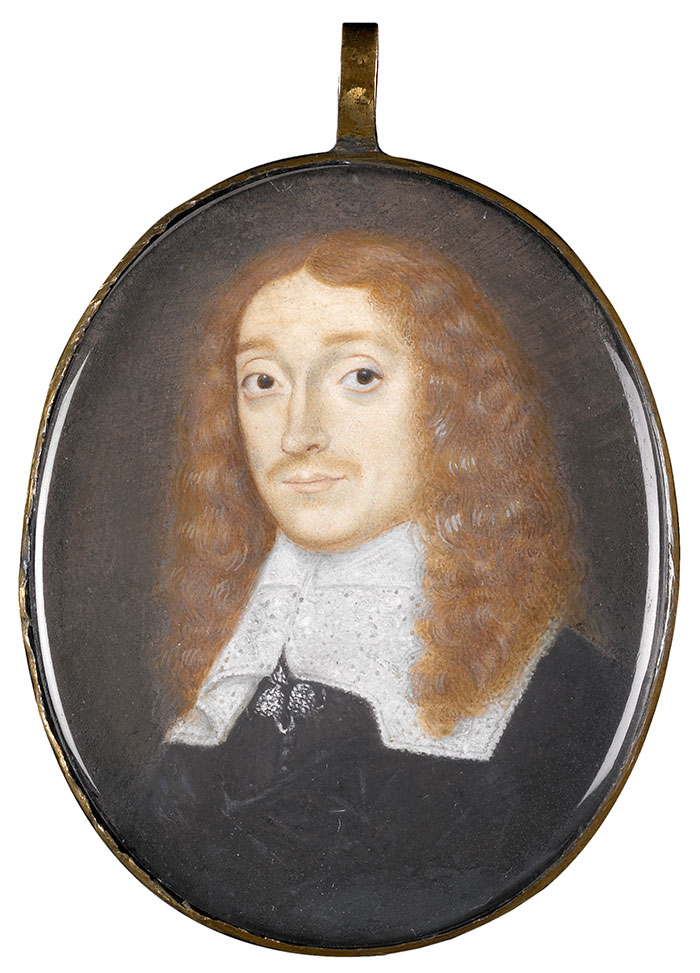
Miniature portrait of an unknown man,believed to be John Milton
Watercolor on vellum
Gift of J. P. Morgan, Jr.
This portrait of a middle-aged man, costumed in a black buttoned vest, black gown, square white collar tied with strings and having two tassels below, is believed to depict John Milton at forty-eight years of age. According to John Aubrey, an early biographer of Milton, the poet's long hair was "abroun" or "reddish," and his "complexion exceeding fayre." This miniature may have been given by Milton to his second wife, Katherine Woodcock, whom he married in November 1656. She gave birth to a daughter in October 1657, but both mother and child died the following year. Woodcock is commemorated in Sonnet 23 as "my late espousèd saint." The miniature was bequeathed to Woodcock's niece and was handed down in direct succession through the Woodcock family.